#bill anderson mood board
Text




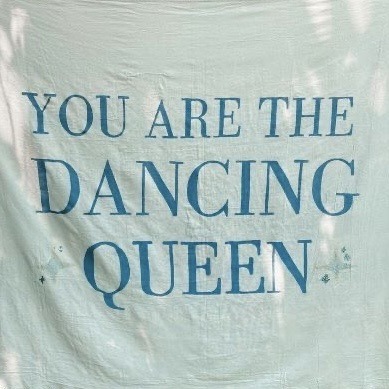



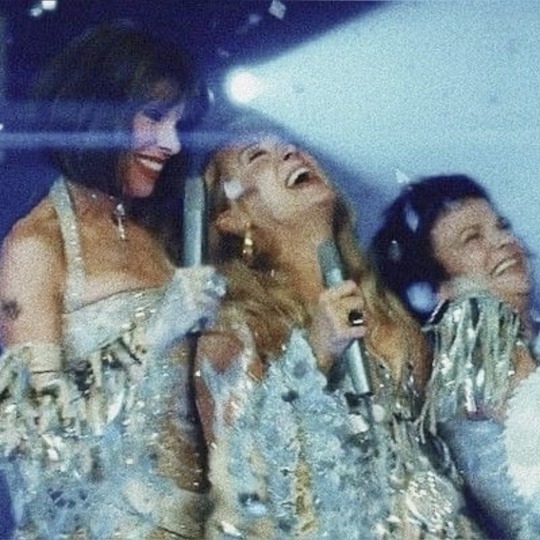
Mamma Mia! mood board
#mamma mia#mamma mia here we go again#abba#dancing queen#i have a dream#thank you for the music#money money money#the winner takes it all#waterloo#greece#voulez vous#donna sheridan#sophie sheridan#sam carmichael#harry bright#bill anderson#rosie mulligan#tanya chesham#sky#favorite movies#love this movie#mamma mia mood board#asethetic#greece asethetic#original post
40 notes
·
View notes
Text




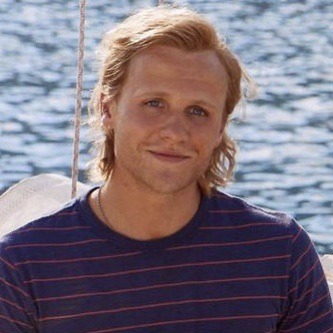

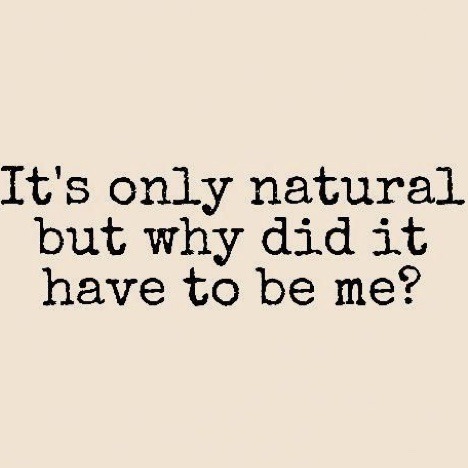


Mamma Mia! Here We Go Again - Summer Fling - Bill Anderson
“...Young, Tall, dashingly handsome!”
#mamma mia#mamma mia here we go again#young bill#young bill anderson#aestethic mood board#mood board#mamma mia mood board#bill anderson mood board#movie character mood board#what else can i tag this with ‘mood board’ attached to it!?#young bill is going to be the death of me
37 notes
·
View notes
Text
Horizon’s Ghost
Setting: ME2, right after Priority: Horizon
Characters: Rani Shepard, Garrus Vakarian
Content: F!Shepard x Kaidan / SFW / 99% written to get one stupid joke out of my system
Shepard didn’t deal well with failure. Turned out she wasn’t great with disappointment either.
Also on AO3
Horizon had been a nightmare.
Oh, Mordin’s upgrades had protected them from the swarm, just as he’d said they would. They’d taken down everything the Collectors could throw at them and driven them away with their harvest incomplete. But ultimately they’d been too late for most of the colony, and that counted as mission failure in Shepard’s eyes.
Shepard did not deal well with failure.
And then there was seeing Kaidan again… nothing could have prepared her for that. He’d always been in a corner of her mind, ever since she awoke. She’d quietly imagined countless scenes of their reunion: Part of her kept an eye out for him every time they went to the Citadel, hoping happenstance would see them brought together. They’d laugh, they’d kiss, they’d cry, and they'd pick up right where they'd left off, as if it had been nothing but a few weeks apart. It was soppy and ridiculous, and all that was missing was the swelling soundtrack.
None of her idle imaginings had included the sweat, the blood, the stink of eezo, or the look of confusion that had turned to utter wounded betrayal when they finally stood face-to-face. She hadn’t imagined the clipped accusative tone of his voice, the hardness in what had always been such soft warm eyes. She hadn’t imagined how much it would hurt. They couldn’t have left the colony quickly enough after that and she’d refused to meet anyone’s eyes in the shuttle, lest they see how hard she was struggling to build a dam against her welling emotions.
Turned out Shepard didn’t deal particularly well with disappointment either.
-
She’d been fending off call-me-Kelly ever since they’d returned to the ship. No, she didn’t want to talk about the mission; no, not about seeing Kaidan either; no, definitely not about her attitude to failure; NO. She did not want the interfering naive busybody taking notes and reporting back any more than she already did. What she wanted was to take a hot shower, cry for about an hour, eat dinner, go to bed, and maybe cry some more. Maybe hit something, should a target present itself.
She’d managed step one of that plan. Hot water had washed away the dirt and sweat of the mission and eased her tense muscles, but not her mood. She’d dried off and wrapped up in her dressing gown–warm and soft and totally devoid of Cerberus emblems, courtesy of their last trip to the Citadel–and was squeezing the moisture out of her hair when someone tapped at the door.
“I told you it’s none of your fucking business, Chambers!” Rani snapped.
“Shepard, it’s me.” Garrus’s drawl was unmistakable even through the bulkhead. She paused in towelling her hair for a moment but then went on with renewed intensity, resolutely ignoring him.
A minute later: “Still here, Shepard.”
Rani let out an exasperated sigh. She went to the door and glared at the interface for a moment, then opened it to transfer the glare to the persistent turian on the other side.
“Not now, Vakarian. It’s been a long day.”
“I know. I thought you might want to talk about it.”
“Nothing to talk about,” she said, with a shrug that wasn’t convincing anyone.
Garrus slipped past her and sauntered into the cabin while she made ineffectual protesting noises. He noted the photo frame face down on her desk. Though it was his first time in her cabin it didn’t take any great leap of deductive reasoning to guess whose face had been slammed into the desktop. He picked up the frame, which lit up at the contact, and found exactly the portrait he’d expected on the other side.
“You know,” he began casually. “I went to your memorial. Nice ceremony, if a little pompous. Everyone was very complimentary, especially the people who’d never met you. No-one who had could have said such nice things, not with a straight face.” Shepard couldn’t help but smile a little at that, despite her determination to stay disgruntled. “Anderson was more realistic, said you were a pain in the ass but you knew how to get the job done and we’d all be a little weaker for your loss, though he may have said it more politely than that. He asked Alenko if he’d say something too, but I don’t think he had the words. Not for that crowd anyway. Now, I don’t know much about human mourning rituals but getting extremely drunk seems to be important, so as soon as we found a bar that could serve a dextro beer, I obliged. You know Kaidan starts to glow when he’s drunk a lot? At least I think that part was real, hard to tell in hindsight, there really was a lot of alcohol…” Garrus shook his head. “In any case: we talked, the way men who are very drunk and very sad do.” He carefully placed the frame back on Shepard’s desk with Kaidan’s shy smile pointed right at her, the sniper’s precise shot to the heart as unerring as ever. “He’s angry now, but I don’t think he could hate you even if he tried.”
Rani regarded the portrait for a moment, her eyes downcast, before speaking. “I know.”
“You do?” Garrus’s mandibles did the thing Shepard had always interpreted as turian eyebrow raising. “Damn, I was all prepared to talk you round. I had a speech ready and everything.”
Shepard shrugged. “I suppose I should have expected his reaction. If our roles were reversed it… would not have been so dignified. There’d be yelling and broken things. Probably no colony left at all.” She hugged her arms close to her chest. “I don’t know what I thought was going to happen. I hoped he’d be glad to see me, that he’d understand and everything would go back to how it was but it’s… more complicated than that. And after you and Tali took it all in your stride, I guess I–” She stopped and shook her head, dismayed at the insane unlikelihood of her situation. No-one was equipped for the dead coming back to life, not the bereft nor the departed themselves. Kaidan had called her a ghost, and that didn’t seem far off. It should be a wonder that anyone was coping.
“Oh, there was some processing to be done, believe me,” said Garrus. “But it had to wait until after the siege and the rocket to the face and the lifesaving surgery, after which Commander Shepard being not so dead didn’t seem like such a stretch.” He paused. “Also I’d had a message from Tali right before that all went down, the gist of which was ‘What And How The Fuck’.”
Shepard huffed a half-hearted laugh. “Good question.” She flopped back against the illuminated glass of the fishtank and slid down until she sat on the floor. After a moment Garrus hunched down next to her.
“I guess he told you all about us then?” asked Rani, looking down at her hands as she absently picked at her fingernails. “Our illicit affair.” That sounded dramatic, but it was true enough. They’d both known how much trouble there’d be if they were found out, but that had seemed less and less important as time went on.
“Didn’t really need to, Shepard.” Garrus sounded apologetic, but also slightly amused.
“Oh.” She winced, not sure if she wanted the answer to her next question: “Did everyone know?”
“Not everyone. But I think most of us realised there was a little more going on than you wanted us to see.”
She shook her head ruefully. “We thought we were so discreet.”
“Oh, no, you were pretty good. No-one ever caught him sneaking out of your cabin or anything. But you couldn’t hide some things: The way you looked at each other, or stood a touch closer together than normal, the way he’d help you with your armour, or all those little wordless agreements. Anyone who spent much time with the two of you could tell how close you were. And you forget- I was a detective. May not have found anything solid on Saren but you two were a much easier case to crack.”
“I’m not sure that comforts me… Who knows, maybe there’s a court martial waiting for me if I ever get back to the Alliance. Though I suppose fraternizing with a fellow officer might be quite low on the list of my offenses. Did kind of mutiny and steal a ship even before I was a traitor.”
“You saved a colony from being totally wiped out. You’ve saved a lot of people. As far as I can see you’re doing the same job you always did, how’s that make you a traitor?”
“Oh, maybe because it’s Cerberus paying the bills? They’re the enemy, and here I am working for them. With them,” she quickly corrected herself. She grew quiet again. “Kaidan certainly thought it did.”
“He’ll come around. Right now he doesn’t have all the facts.”
“I’m not sure that I do either. I just wish we’d had more time to talk. Explain, in as much as I can.”
“Think you could have talked him into coming along?”
“Yes. No. I don’t know... Maybe it’s best that he’s not involved. They’d only find a way to use him to manipulate me. Again.” The last word was bitter in her mouth. Clearly her old crew weren’t the only ones to put two and two together. They’d known exactly how to invest her in Horizon. No, the further away Kaidan was the better it was for both of them. Not that all of her was on board with that conclusion. “I just wanted more time to talk. For him it's been years but for me it feels like only a few months. He's worked through it all and gotten over me, while I'm still- I’m still newly in love.” Her voice wavered and tears suddenly welled up, the carefully constructed floodgates of her composure finally bursting open with the admission. She buried her face in her arms. “It's so stupid.” Her shoulders shook and her words were muffled as they were forced out between sobs. “I’m a goddamned marine. N7. The first human Spectre. I won the Star of Terra when I was twenty-two. I’ve come back from the dead, faced geth and collectors and husks and reapers and rogue Spectres and- and I'm sitting here in my dressing gown crying over fucking Kaidan Alenko.”
There was a thoughtful pause.
Turians could not, technically, smirk. They didn't have the mouths for it. You needed lips and different cheek muscles. But there was a way that they tilted their heads and did a thing with their mandibles that was close, and Garrus had a voice that was basically an aural smirk anyway. So when he spoke next Rani assumed that his words were delivered with a smirk.
“Isn't this about… not fucking Kaidan Alenko?”
Her mouth formed an indignant O as she looked up, red eyed, at Garrus and smacked him on the arm. It wasn't hard and he probably couldn’t feel it through the armour and carapace, but it certainly made her feel better. “I am heartbroken and in tears, Vakarian, and you're making shitty jokes!”
“Oh come on, Shepard, I couldn't leave that there. And now you're laughing and crying, that's an improvement, right?” Shepard knew a shit-eating-grin when she saw it no matter the shape of the face it was on.
“I saved your life and this is the treatment I get?” She sniffed and wiped her nose with the back of her hand, a small grudging smile fighting the urge to resume crying. “I can’t believe I let you back on my crew, you’re terrible.”
“True enough.”
“Of all the people I could have had back I had to get the smart-arse turian.”
“Humans tell me that beggars can’t be choosers. Also something about the use of projectiles in glass structures that I’m not sure if I’m remembering correctly.” Garrus looked down at her very seriously. “I don’t know if anyone’s told you, but you’re kind of a smart-ass yourself.”
“You’re just trying to rile me up so I’m not miserable anymore.”
“Well, I know how to deal with you when you’re angry, I’m… I’m not sure what to do with sad,” he admitted. “I’m not very good at this.”
The fight went out of her in one breath. “Me either.” She wiped her nose again and pressed her lips together as the tears threatened to well up once more. “I miss everyone. Not just Kaidan- Wrex, Tali, Liara–” she paused and sniffed “–Ash. She’d have some things to say right now, I’m sure.”
Garrus chuckled. “Spirits, can you imagine? She’d be even more pissed with you than Kaidan was.”
“No doubt. Maybe if I’d had both of them glaring at me I’d have stayed right there and given Cerberus the finger.”
“I have no idea what that means but it sounds extremely intimate.”
Rani snorted. “I’m really glad you’re here Garrus.” She leaned her head against his shoulder. “Terrible as you are.”
“Hey, someone’s got to watch your back. And without the rest of the old crew around, I guess it had better be the smart-ass turian. Now, what does giving someone a finger mean?”
“With those talons, I think it’s best you don’t know.”
#mass effect#commander shepard#f!shepard#garrus vakarian#shenko#fan fic#rani shepard#rani x kaidan#fic:rani#this has been lurking in my drive almost finished for like a year#my art is speedy in comparison to my writing#it may be awful#the joke certainly is
62 notes
·
View notes
Photo
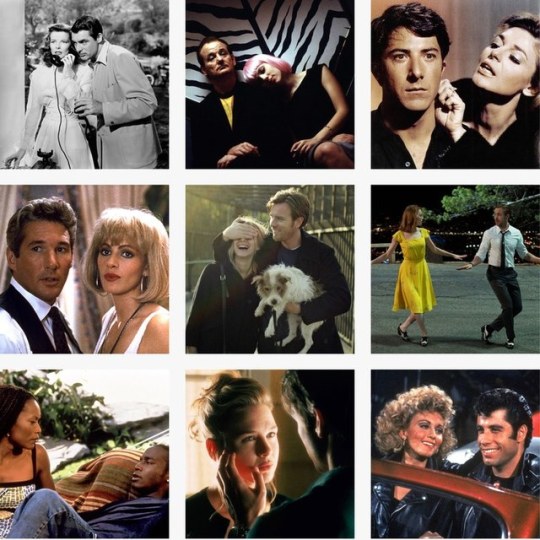
New Post has been published on http://lifehacker.guru/the-55-best-romantic-comedies-of-all-time/
The 55 Best Romantic Comedies of All Time

There is no “best” romantic comedy. Something is funny when someone laughs, or romantic when their heart swells, for better or for worse, and we have no right to say why one of these should top another. Your uncle, or cube-mate might say, “That’s stupid. Breakfast at Tiffany’s is obviously the best rom-com of all time.” And they may not be wrong. But maybe you have some reservations about the horrifyingly racist overtones in some of that movie’s scenes, even though you can’t help loving Audrey Hepburn. Maybe it’s the best for a certain time period. It’s tough. Comedy is subjective. So is romance.
It’s for this reason that we had such a good time making this list, at least initially. And lots of help. People keep a special place in their heart for romantic comedies. They talk about them differently than other movies, and they like to talk about them a lot. When the call went out, we heard from writers, editors, friends, moms, therapists, bartenders, people we hadn’t talked to since high school; the list goes on. The initial gathering of candidates was great fun; the subsequent reaping less so.
First, we had to limit the category. We love Dazed and Confused and it contains plenty of romance, and comedy, but we can’t be sure it’s a romantic comedy per se. Same with Secretary, McCabe & Mrs. Miller, My Girl, Hedwig and the Angry Inch, and about 500 other films. We don’t have enough space here to get into exactly what makes a romantic comedy, but let’s agree that the fact it is not a tragedy or a history is not enough. Somewhere we have to draw the line between the actual rom-coms and the coming of age movies, or mysteries, or adventures.
It’s for this reason we need to apologize in advance: A number of your favorite romantic comedies will not be on this list. Some of them didn’t fit the mold. Others—and this part got a little heated—we just couldn’t get on board with. Decisions had to be made. Hopefully, as a benefit to any disappointment of missing favorites, you’ll find some new ones you didn’t yet know you liked. After all, that’s the message from Pretty Woman, right? It’s important to keep an open mind. Otherwise, you could be making a big mistake, big, huge.
These are the best 55 rom-coms for every situation. We hope you love them.
The Best Rom-Com . . .
. . . to put your one-night stand in perspective:
Obvious Child (2014)
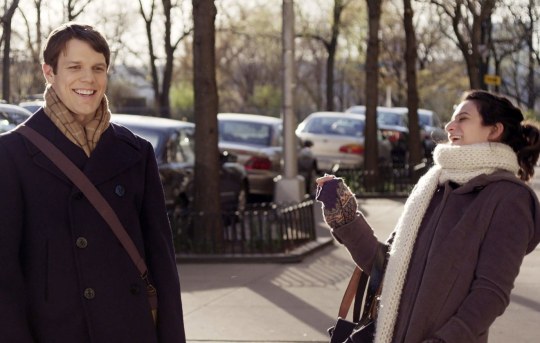
Photo: Everett Collection
The hardest you’ll ever laugh about abortion. That’s right, abortion. Talk about playing with fire, but this tender, deeply human comedy from director Gillian Robespierre finds entirely new ways into the story of losing Mr. Wrong, then Finding Mr. Right (by having our hero, a struggling comedian—played by the irrepressibly honest and infinitely endearing Jenny Slate—get drunk with Mr. Right, sleep with Mr. Right, get pregnant by Mr. Right, and then deal with the consequences). While riotously funny, Obvious Child set a new standard for intimacy, and Robespierre’s ribbed, tone-perfect writing and Slate’s raw but intelligent performance managed to shape a millennial mirror more reflective than anything Girls could put forward in six seasons. And give us the abortion comedy we didn’t know we needed.
. . . to deal with your workplace crush(es):
Broadcast News (1987)
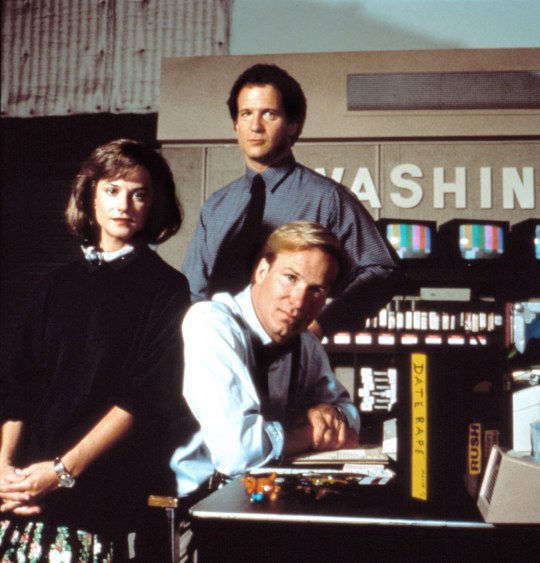
Photo: Everett Collection
In the mid to late ’80s, there was nothing bigger than TV news and James L. Brooks, and Broadcast News was their meeting ground. After the slaphappy, very silly, and very male comedies of the late ’70s and early ’80s (think Animal House, Porky’s, and Revenge of the Nerds), and alongside the epic big-budget projects like Ghostbusters and the original Indiana Jones, James L. Brooks continued to redefine what rom-coms could be with this sprawling, occasionally dramatic but never self-serious, workplace comedy. We root for Albert Brooks’s Aaron Altman, the brainy, nervous, serious journalist who competes for the affections of neurotic producer Jane Craig (Holly Hunter) against the impossibly polished (and intellectually inferior) Tom Grunick (William Hurt). Brooks is the producer behind films like Bottle Rocket, Say Anything . . ., and Big, and TV series like Mary Tyler Moore, Taxi, and The Simpsons. No one knows how to get at our hearts—thoughtfully, gracefully, and with humor—like James L. Brooks. And this is him at his peak.
. . . to see past a gruff exterior:
Beauty and the Beast (1991)

©Buena Vista Pictures/Courtesy Everett Collection
“Tale as old as time . . .” It really is. Lonely, powerful dudes have been making off with damsels and then hiding them away since at least Greek mythology and probably before. Where Disney scored with its animated musical was in—pardon the pun—reanimating that classic story line in a way that was appealing to our eyes and ears, and that of our kids’, while maintaining some real danger in the narrative. It’s a triumph they repeated with Aladdin and The Lion King, but is especially notable with a romance—making the stakes high enough—and real, even when accompanied by singing teapot—that we root for these characters to end up together.
..for when you’re in the mood for first love, Wes Anderson-style.
Moonrise Kingdom (2012)
“I will meet you in the meadow,” writes bespectacled Sam (Jared Gilman) to serious Suzy (Kara Heyward) as they prepare to run away together. Wes Anderson’s Moonrise Kingdom, a whimsical tale of a romance betwixt a pair of wise-beyond-their-years 12-year-olds (beautifully art-directed and accessorized as always), is a tonic to the jaded palate. The children, with their barely sexual, pure-hearted affection for each other, could teach the misbehaving adults around them a thing or two about love. Who wouldn’t want to dance on the beach in their underwear to Françoise Hardy?
. . . to get you over getting over your ex:
The Philadelphia Story (1940)

Courtesy Everett Collection
The credits of The Philadelphia Story read like something out of a dream: Cary Grant and Jimmy Stewart vying for the love of Katharine Hepburn. It’s produced by Joseph L. Mankiewicz (writer of All About Eve and Cleopatra), and directed by George Cukor (who made 1954’s A Star Is Born, Justine, and My Fair Lady, and once told Marilyn Monroe, “That will be just fine, darling” when, about to film a skinny-dipping scene for Something’s Got To Give, she expressed her concern that she only knew how to dog-paddle). The Philadelphia Story relies on some dependable tropes—lovers who’ve fallen out; will-they-or-won’t-they-get-back-together—that have provided romantic tension from A Midsummer Night’s Dream to Crazy, Stupid, Love. But it’s Hepburn, aiming for a comeback following some serious bombs, and her witty repartee with her two love interests, Grant (her yacht-designing reformed bad boy of an ex-husband) and Stewart (a tabloid reporter), that is the movie’s bread and butter. The Main Line has never been so well represented.
. . . to take on a trip:
Lost in Translation (2003)
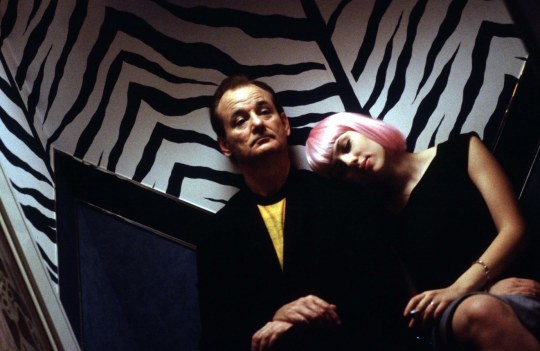
©Focus Films/Courtesy Everett Collection
There was never any doubt that Scarlett Johansson was going to be a mega star, but Sofia Coppola’s movie—about the lonely wife of a photographer who befriends an over-the-hill movie star (Bill Murray) while visiting Tokyo—is what made the world stand up and realize we were dealing with a serious actor. Like many of the films on this list, Lost in Translation takes place in a bourgeois universe, where the greatest thing at risk is someone’s heart, or future emotional happiness, but few films have so effectively crystalized the alienation of both travel and marriage, as well as the difficulties of postcollegiate, and then midlife, malaise. The older man and the younger woman don’t so much meet-cute as crash into each other, picking up each other’s pieces, redeeming each other’s lives as they navigate their surreal setting. It’s a match made in heaven—and without spoiling anything, their goodbye scene is among the best in Hollywood history.
. . . to reevaluate your checklist:
Clueless (1995)

©Paramount/Courtesy Everett Collection
The motherless daughter, caring for her father and looking for her prince, is a trope that goes back to the fairy tales, but how Alicia Silverstone (who plays our hero, Cher) and writer-director Amy Heckerling contemporized that narrative is what made what could have been a silly teen flick into an instant classic. They imported a Jane Austen story line of a meddling would-be matchmaker (Emma) into a bright pink, plastic, kids-are-adults world of Beverly Hills privilege populated by overly dramatic in-talk (“Whatever!”; “As if!”), lunatic high fashion, and decidedly un-relatable problems. At the same time, they maintained a storybook sensibility, and somehow kept our sympathies with the lovelorn Cher, whose insipidness is overshadowed by her charity, loyalty, and genuine goodwill. We believe she deserves love, and if she gets smart enough to stop looking for it in the “right” places, we want her to find it.
. . . to help you sort out what to do with the rest of your life:
The Graduate (1967)
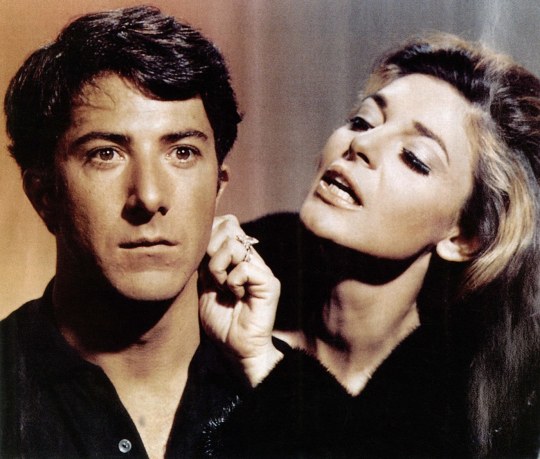
Courtesy Everett Collection
This is the film on this list that is least certainly a rom-com; it caused a bit of a row, in fact. Some of us believe that this movie is ultimately too sad to give the viewer the warm fuzzies they depend on this genre for. Others argue that this line of thinking may confuse what’s depressing with what’s complicated. The story of the listless Benjamin Braddock, recent graduate of Williams College, who begins an affair with his father’s partner’s wife, and ends up falling for her daughter, did more to advance the critical value of comedy than perhaps any other film. (Not to mention the sexual viability of Williams grads.) There may be no more iconic line than Dustin Hoffman’s “Mrs. Robinson, you’re trying to seduce” but this movie is so much more than dialogue. (Note: Hoffman might have been playing 21 when he said this line, but the actor was 29; Anne Bancroft, the supposedly senior Mrs. Robinson, was all of 35.) Oft-quoted, ripped off, referenced, and discussed, Mike Nichols’s 1967 romp through Braddock’s postcollegiate uncertainties was released a few months after the Summer of Love, as the counterculture had peaked and what Hunter S. Thompson called the “high and beautiful wave” was getting ready to roll back. Young America was, and to some extent still is, Benjamin Braddock, which reveals the power of this film.
. . . to ask for assistance in the ol’ love department:
Sleepless in Seattle (1993)

©TriStar Pictures/Courtesy Everett Collection
Tom Hanks had been responsible for some ’80s hits—Splash and Big—but with Nora Ephron’s 1993 film about a widower whose son calls in to a radio show in an attempt to find him a new wife, he cemented himself as America’s favorite, well, person. Meg Ryan, his competition for that title (at least in the ’90s), plays an unhappily engaged Baltimore Sun reporter who writes Hanks’s character on a whim, asking him to meet her at the top of the Empire State Building (cue: An Affair to Remember) on Valentine’s Day. Utterly contrived, but utterly charming, this quick, silly, funny film is pabulum superfood for anyone who believes in second chances and true love.
. . . to leave the past behind you:
Breakfast at Tiffany’s (1961)

Courtesy Everett Collection
No one has stolen more hearts than Holly Golightly (Audrey Hepburn). Based on Truman Capote’s 1958 (harsher) novella of the same name, Breakfast at Tiffany’s—the story of a friendship struck between a rarely employed writer, Paul Varjak, and his neighbor, the naïvely beautiful Golightly, a freewheeling party girl whose lifestyle is paid for by the rich suitors who surround her—is a building block of our Hollywood romantic fantasies. It has the unclassifiable, magnetic object of affection, the reliable underdog who pursues her, expectations dashed, new friendships formed, true selves discovered, and an undeniably racist portrayal of an Asian landlord (by Mickey Rooney). Yes, it was a different era, but this detail can be difficult to ignore. That said, there are generations of viewers who consider this the greatest rom-com of all time.
. . . to get past that one little (or gigantic) flaw:
Moonstruck (1987)

©MGM/Courtesy Everett Collection
Cher plays a widowed bookkeeper in Brooklyn Heights confronting her parents’ infidelity (and fallibility) who—whoops!—falls for her fiancé’s younger brother (Nicolas Cage), who sports a prosthetic wooden hand after an accident with a bread slicer. Their first night together produces one of the great moments in the annals of rom-coms: When Cage tells Cher he loves her, she slaps him, saying “Snap out of it!” The film portrays a New York that doesn’t really exist anymore—for one thing, Brooklyn Heights is full of bankers now. It’s a window to another time, when marriage meant something different in male-dominated second-generation immigrant families and the challenges Cher’s character places against the social order are both important and revelatory (she won an Oscar for her efforts). You end up cheering not just for her romance, but also for an entire insurgency.
. . . to put the fuckboys behind you:
Bridget Jones’s Diary (2001)
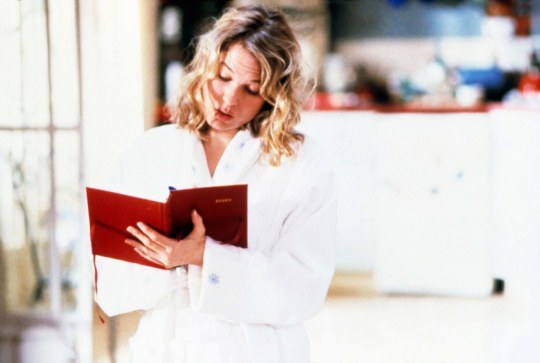
Courtesy Everett Collection
Hollywood does this silly, shitty thing when they want to make it clear that a woman is “funny”: They make her clumsy. “Did you see that? She fell down in front of the boss she has a crush on while carrying many things! What a wit!” Thankfully, this film is actually funny, and so is Renée Zellweger, the titular Bridget Jones, who is 32 and a bit clumsy, and believes herself to be both a tad overweight and running short of romantic options. She confesses to her diary her feelings about the men in her life: her caddish colleague, Daniel (Hugh Grant), and her pill of a childhood friend, Mark Darcy (if that surname sounds familiar from one of your favorite literary comedies, that’s not by coincidence), who begin vying for her hesitant affections in their respectively charmless ways. Who will win—the nice guy or the jerk? The clumsy, funny, openhearted girl, of course! The story has a classic but important lesson to share: First impressions aren’t everything (and a fashion-related takeaway—never judge a man by his Christmas sweater).
. . . to make you even more neurotic about your love life:
Annie Hall (1977)
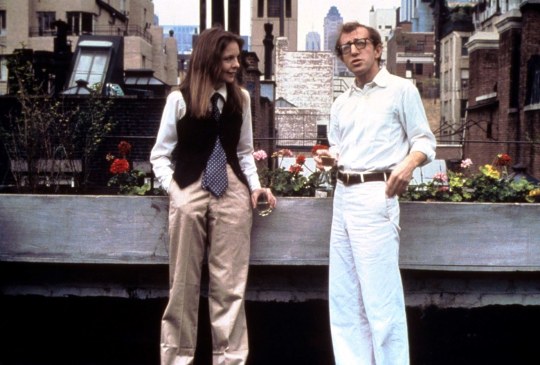
Courtesy Everett Collection
Like Breakfast at Tiffany’s, this is one of those movies that any list of top rom-coms would be remiss without. Yes, Alvy Singer’s (Woody Allen) story about how he met, and then lost, and then maybe regained, the love of his life, Annie Hall (Diane Keaton), is a wonderfully funny underdog-meets-girl story. But Allen’s uniquely observational humor also introduced some pioneering tropes and storytelling devices to the annals of rom-coms. The moment his grade school classmates stand up and give short peaks into their future (“I used to be a heroin addict; now I’m a methadone addict”). Or when Alvy interrupts a pedantic professor in a movie line—lecturing his date on Marshall McLuhan—by bringing the actual Marshall McLuhan out from behind a sign to set the man straight. These established entirely new directions for comedy. Moreover, Allen’s confessional style and the monologue with which he begins telling his warts-and-all fictional tale established a new paradigm for romantic storytelling, one that continues to influence rom-coms today (same for Diane Keaton’s outfits, but that’s a topic for another list).
. . . to get you pumped up:
Bring It On (2000)
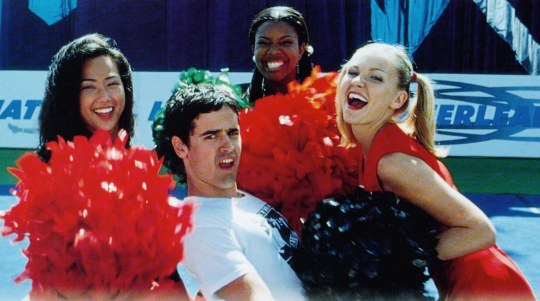
©Universal/Courtesy Everett Collection
This is the pregame of romantic comedies. It’s a love story—between millennial hotties Kirsten Dunst and Jesse Bradford—packed into 98 minutes of jokes, rivalries, teen romance, and ridiculous cheers. (“Hate us ’cause we’re beautiful—well, we don’t like you either. We’re cheerleaders. We. Are. Cheerleaders!”) Some of us have defended this movie since it bowed (and then cartwheeled into an aerial walkover) in 2000 as a sharp appreciation of teen culture and teen cinema, both devoid of cynicism and long on wordplay. If you agree, welcome to the squad. If not, please keep in mind, “This is not a democracy; it’s a cheer-ocracy.”
. . . to take an break from yourself:
Roman Holiday (1953)

Courtesy Everett Collection
There’s a wonderful moment in Roman Holiday—the story of a European princess, played by Audrey Hepburn, who tires of her duties and runs away from her handlers while visiting Rome—when Joe (Gregory Peck), a reporter showing her the city, puts his arm in the Mouth of Truth (a statue that supposedly bites off the hand of liars) and removes it with his hand missing. The princess screams—Hepburn was apparently not acting here—and then recovers. It’s a metaphoric yawp for all that a romantic comedy should be. It’s being taken by surprise, taken by a stranger, the discovery a new side of oneself while falling for someone else. And that’s just one moment!
. . . to get him into rom-coms:
The Princess Bride (1987)
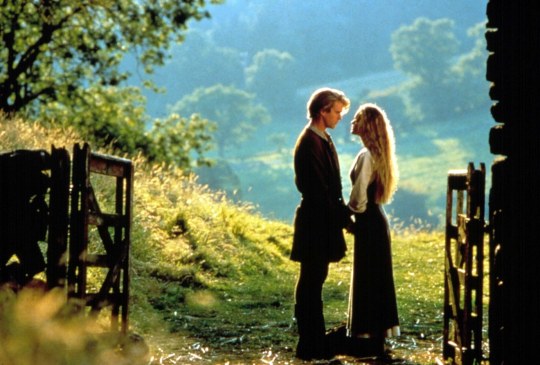
©20thCentFox/Courtesy Everett Collection
“Is this a kissing book?” Fred Savage’s little boy asks his grandfather, at his bedside to read him The Princess Bride when he’s home sick from school. Sure is, but it’s also a tale of swashbuckling, cruel kings, giants, swordsmen, poison, monsters, rebels, and knights—without a dull or unfunny moment. The kid, and the viewer, is quickly on board. More than anything, it’s a tale of true love, and fantastic as it might be, the adventure that leads the stable boy, Westley, back to his mistress, Buttercup (played by an impossibly beautiful Robin Wright), has left few hearts unmoved, and few faces without with smiles.
. . . to consider what you could have done differently:
Groundhog Day (1993)
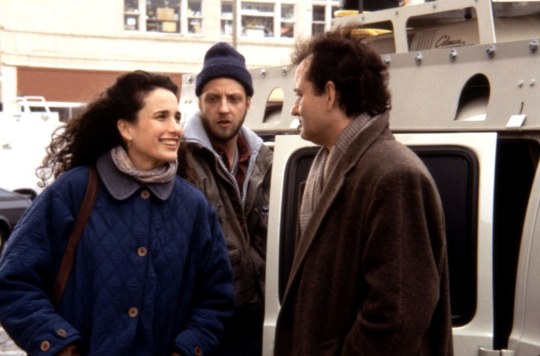
©Columbia Pictures/Courtesy Everett Collection
One of the few rom-coms that comes with both a stamp of approval from your philosophy professor and the Tony reaches of Broadway. A cynical Pittsburgh weatherman (Bill Murray) is sent to Punxsutawney, Pennsylvania, with his producer, Rita (Andie MacDowell) on a dead-end assignment: to cover Groundhog Day. And boy, is it a dead end. Murray gets stuck there, not just in a snowstorm, mind you, but in a continuous loop where no matter what he does—including suicide—he wakes up in the same hotel, on the same day. At first, the weatherman is predictably bummed, but eventually he uses all the information he’s picked up living the same day over and over to better himself and the lives of those around him, eventually impressing Rita with his change of personality. Watching Bill Murray is fun, watching Bill Murray struggle is really fun, and watching Bill Murray caught in a space-time logjam, wrestling with moral philosophy while pursuing Andie MacDowell is the most fun.
. . . to find “our song”:
Nick and Norah’s Infinite Playlist (2008)
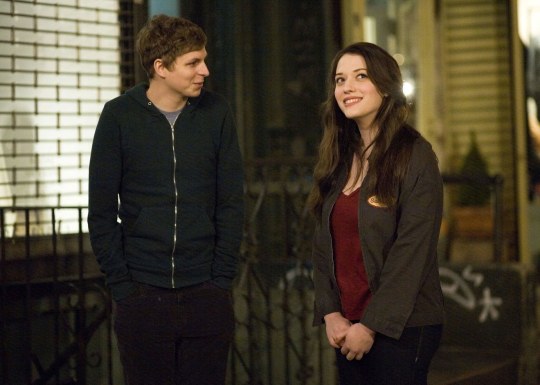
Entertainment Pictures / Alamy Stock Photo
There’s something almost quaint about Norah’s search for her orgasm. The high schooler, played by Kat Dennings, is demeaned by her fellow classmates for having yet to experience the big O. It may sound tawdry, yet this plot point harkens back to a sweeter, John Hughes–era teen comedy (with a few switches flipped) wherein the search for a simple sex act was enough motivation for a number of scenes, if not an entire film. Norah’s lack of fulfillment isn’t what moves the action here; instead we’re on a search for her best friend and an oh-so-cool band’s secret show, with Nick’s (Michael Cera) hapless band, in his hapless car (a Yugo), through downtown New York City’s music scene. It’s a good-time flick, with cheerful performances and the kind of supporting cast (Ari Graynor as the beyond-drunk best friend) that make 90 minutes seem like a brisk 30. One of these is Alexis Dziena, who plays Nick’s very recent ex-girlfriend: She toyed with him and never appreciated the music mixes he made for her (spoiler: Norah loves them). Her “sexy” dance, in the glaring light of Nick’s high beams, to Hot Chocolate’s “You Sexy Thing” is one of the great falls from grace, and worth the price of admission.
. . . to inspire some big changes:
Pretty Woman (1990)

©Buena Vista Pictures/Courtesy Everett Collection
Is there a rom-com list that doesn’t include this movie? What’s left to say about the 1990 tale of the beautiful, charming prostitute and the Wall Street corporate raider who meet and fall in love? Here’s director Garry Marshall’s (and Julia Roberts and Richard Gere’s) genius with this film: They make us forget about the various horrors of sex work and instead convince us the whole thing is kind of a lark. This film takes place in the late 1980s; a high-water mark in terms of the HIV crisis. Those things aren’t on our minds when we watch this movie (barring an early scene discussing methods of birth control); we think about stomping divots and Richard Gere conquering his fear of heights. So what? The Great Escape doesn’t exactly feature the horrors of World War II. That’s not the story they’re telling. Exactly our point. That’s how delightful this movie is.
. . . to make your arguments a little sweeter:
Bringing Up Baby (1938)

Courtesy Everett Collection
Here’s how cute rom-coms were in the 1930s: The entire plot rests on a dog burying a bone of a brontosaurus. Katharine Hepburn, whom the movie was written for, plays a whimsical, adorable socialite who has become besotted with an otherwise engaged (literally and figuratively) paleontologist, played by Cary Grant, and is trying to keep him around so he won’t go marry some pill. Her strategy for doing this is to invite him to her house so that he can help her bring a baby leopard to the city. (Later, the dog and the leopard wrestle.) This is what we call a screwball comedy. It’s also priceless, with Hepburn peppering Grant in her sweet, Gatling gun style, and Grant, playing stiff, as if any man, never mind a mild-mannered paleontologist, could ever resist such wiles.
. . . to make it a girls night:
10 Things I Hate About You (1999)
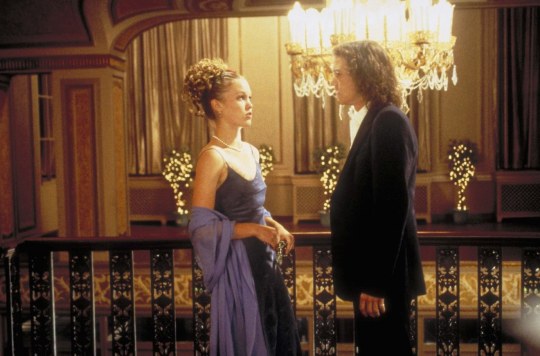
©Buena Vista Pictures/Courtesy Everett Collection
Why is there no actual Shakespeare on this list? Because often a three-hour production: (1) is rarely funny, and (2) doesn’t really fit into a modern romantic comedy structure. Instead, we have movies that are actually fun to watch, like Shakespeare in Love, and this one, a teen-ready take on The Taming of the Shrew. There are some cute turns from youngsters Joseph Gordon-Levitt, Julia Stiles, and Larisa Oleynik, but ask most women and the performance that sticks out is Heath Ledger’s, whose thuggish Patrick Verona made many of us weak in the knees. Like Bring It On, and unlike most films, especially teen films, this one is female focused. They’re the moral centers. The heroes we cheer for. And they are active in as much as the narrative as they are subject to it (rare!).
. . . to better understand your parents:
Beginners (2011)

©Focus Features/Courtesy Everett Collection
“The History of Sadness” is a sketchbook drawn by Ewan McGregor’s Oliver, a graphic designer who is dealing with the recent coming out of his septuagenarian father, Hal (Christopher Plummer—who won an Oscar for his performance). Hal’s new openness about his own life inspires Oliver to reevaluate his own sadness and pursue a lovely French actress, Anna. It’s an incredibly touching, difficult story, told mostly in flashback, that involves Oliver coming to grips with his father’s past, his parents’ relationship, his own choices, and his art. But it’s ultimately a love story. A story about how our parents love us, and each other—despite the difficulties imposed society, time, and work—and how in turn, we learn to love, or not. We’re all beginners, in all our loves, and to think otherwise is foolhardy.
. . . to freeze some already cold feet:
The Wedding Singer (1998)

©New Line Cinema/Courtesy Everett Collection
Millennials might not realize from Adam Sandler’s recent descent into perennial schlock (some of it racist and sexist)—like The Ridiculous 6, Blended, Jack and Jill, and Grown Ups—that his movies were, at one point, very funny. Billy Madisonand Happy Gilmore are ’90s classics, and The Wedding Singer, his only rom-com from that era (there’s some debate over whether P. T. Anderson’s Punch-Drunk Love, released in 2002, qualifies as such), is a hilarious, touching ode to traditional values. Set in the ’80s, Sandler’s Robbie Hart is a wedding singer (and hopeless romantic) recently left at the altar who helps Drew Barrymore’s Julia plan her wedding to the wrong man. Sandler and Barrymore’s chemistry is off the charts, and this film—not Mad Love, sorry—established the actress as rom-com gold (see Never Been Kissed, 50 First Dates, and Fever Pitch). The romance is great, the jokes are great, the costumes are great, and not to ruin anything, but Billy Idol is pretty great too.
. . . to get you singing and dancing (and maybe moving to L.A.):
La La Land (2016)

©Lions Gate/Courtesy Everett Collection
The highway scene. Ryan Gosling hunkered over the piano. Emma Stone embodying “irrepressible.” His dance on the boardwalk. Her spins. The way she pulls at her dress. The way he grins while he smolders. Their love. It’s a panacea for the reasons we go to the movies. At no point do we believe they won’t end up together, but we stay transfixed, in fact we tap along. For younger viewers—those of us who might not have drank down the moving magic of Singin’ in the Rain, West Side Story, or Gigi—Damien Chazelle’s La La Land forgives those lapses. It embraces their greatness as it embraces us in its giant, vibrant arms. We lean closer to the screen, not to learn but to feel for the whole experience of youth and performance: all that hope, drive, sweat, and love. Can’t forget love.
. . . to kick-start your career goals:
Singin’ in the Rain (1952)
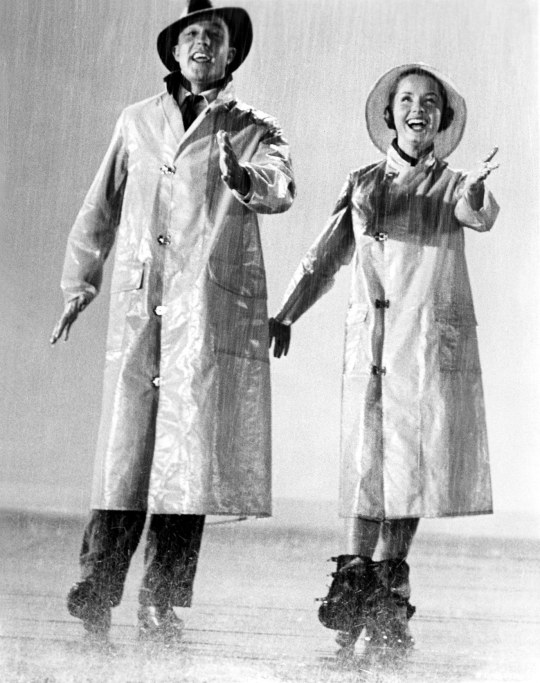
Courtesy Everett Collection
Here’s the thing: You’re not really allowed to like La La Land if you don’t like Singin’ in the Rain. Or, you at least have to watch it; it’s the original musical about making it in Hollywood. The story of a sellout leading man (Gene Kelly) who falls for the chorus girl (Debbie Reynolds) who might just change his life (and he hers), this 1950s romp through 1920s Hollywood really has it all: singing, dancing, and bedrock songs like “Make ’Em Laugh,” “Good Morning,” and of course, “Singin’ in the Rain.” It’s cute as hell and tap-happy to the extreme.
. . . to unplug from the office (and get your due):
How Stella Got Her Groove Back (1998)
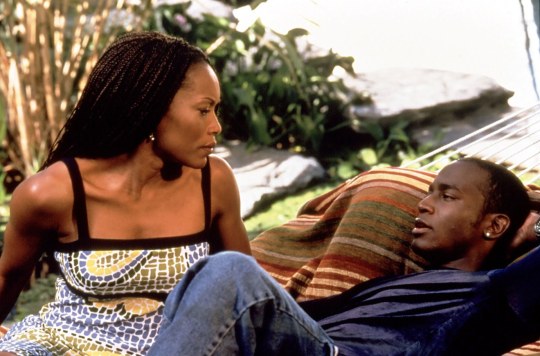
©20thCentFox/Courtesy Everett Collection
The movie that inspired 90 percent of vacation hookup jokes since 1998 (but seriously, we need to talk about Taye Diggs in a puka shell necklace; the man can make anything look good). Workaholic executive and single mom Stella (Angela Bassett) finds more than she bargains for when her best friend, played by Whoopi Goldberg, convinces her to take a much-deserved Caribbean vacation. Cheeky, subversive, and sexy as hell, this movie turned the tables on so many male-dominated rom-coms (courtesy of one very hot and heavy matchup between Bassett and Diggs, playing some 20 years her junior)—and passes the Bechdel test with flying colors. One of the very few rom-coms to do so.
. . . to get dressed up for:
Tootsie (1982)
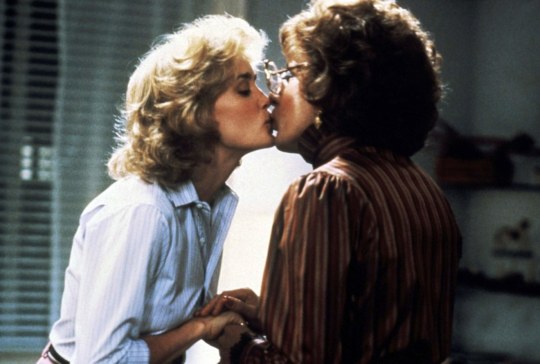
©Columbia Pictures/Courtesy Everett Collection
Michael Dorsey (Dustin Hoffman) is a New York actor who is such a perfectionist, no one wants to work with him. So he does what any rational man would do: He dresses as an entirely different person—an older woman who goes by then name of Tootsie—and lands a role on a soap opera where he becomes a sensation. Problems arise when he falls in love with his costar (Jessica Lange) and a fellow castmate, an older man, falls in love with him. It’s madcap and zany but also profoundly funny, with insights aplenty—it sends up television, sexism, and New York society—and performances that were Oscar-worthy (Lange’s in particular—of Tootsie’s 10 Oscar nominations, she’s the only one who walked away with a statue).
. . . to reevaluate the nice guy (and the bad boy):
Something Wild (1986)

©Orion Pictures Corp/Courtesy Everett Collection
Before Johnathan Demme decided to win an Oscar and scare the pants off an entire generation with The Silence of the Lambs, he was an ’80s funnyman. And this is his best work. It’s the story of a mild-mannered exec (played by Jeff Daniels), whose sedentary life is turned upside down by the wildly adventurous, somewhat grifting Lulu (Melanie Griffith)—whose checkered past includes a roustabout, criminal ex-boyfriend played by Ray Liotta. The idea of a “crazy” girl coming in and turning a straight man’s existence topsy-turvy is repeated countless times in this genre, from Bringing Up Baby to The Girl Next Door. Demme’s alchemy here is to infuse the trope with unpredictability. The comedy keeps us on the edge of our seats by compounding the will-they-won’t-they question with sudden breaks into violence, threats, or chase. Rom-coms don’t get more exciting than this.
. . . to escape it all:
Midnight in Paris (2011)
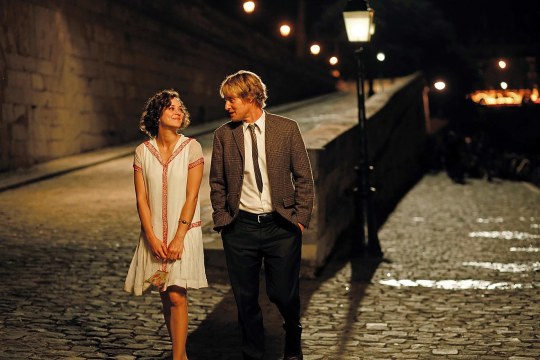
Sony Pictures Classics/courtesy Everett Collection
The love story here is as much between writer-flaneur Gil Pender and Paris as it is between Gil and any of the women in this film. While visiting the French capital with his uptight fiancée, Inez (a sublime Rachel McAdams), and her parents, each night Gil goes walking and finds himself in the City of Light of the 1920s, complete with Hemingway, Gertrude Stein, the Fitzgeralds, Man Ray, Josephine Baker, Cole Porter . . . and a beautiful woman named Adriana (Marion Cotillard). It’s a writer’s fantasy made real (Stein volunteers to read his novel), but it’s also Woody Allen at his most effective: taking the vicissitudes of relationships and turning them into a mirthful, if neurotic, journey. This one just happens to also navigate through another time and place as well. And a beautiful one, at that. There’s a reason this is Allen’s highest-grossing film of all time.
. . . to escape the friend zone:
When Harry Met Sally. . . (1989)
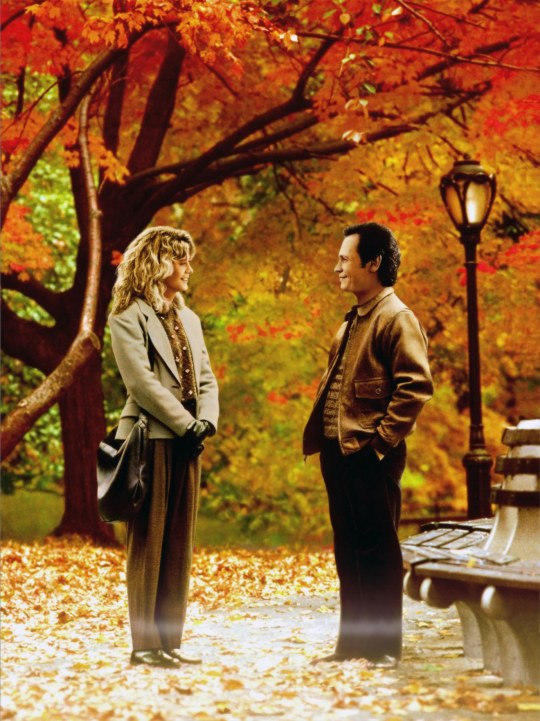
©Columbia Pictures/Courtesy Everett Collection
If this list were a top 20 instead, this film would still be on it. Same with top 10—and five. It’s in the running for the best rom-com of all time because it is sassy, sultry, snappy, cinematic perfection, thanks to words from Nora Ephron and direction from Rob Reiner. It’s something of an epic of the genre, spanning over 10 years of the kind of friendship (between Meg Ryan and Billy Crystal’s characters) where no one can help but ask, “Why aren’t those two together?” Should friends ever sleep together? If they do, what happens next? This movie should be watched by every college student on the planet. Bonus: Watch this movie with a boyfriend, and pay attention to what happens to his face during Meg Ryan’s most famous scene, in which she illustrates just how easy it is for a woman to fake an orgasm.
. . . to unite with your crew:
Bridesmaids (2011)
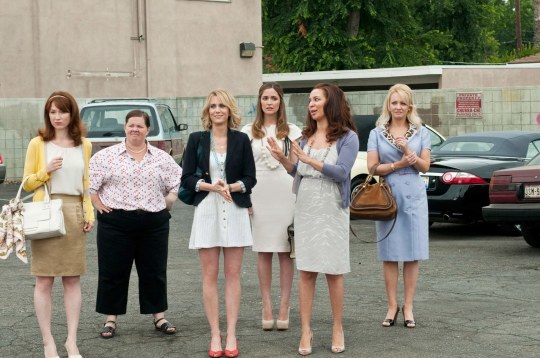
©Universal/Courtesy Everett Collection
Who ever thought getting food poisoning in a wedding dress could be so funny? Bridesmaids is as much a buddy comedy (think Old School or Twins) as it is a rom-com, proving that female actors can be just as bawdy and into gross-out humor as their male counterparts in The Hangover. This is about the love between friends, yes, and the agony that comes with maturing at different paces, but what ultimately drives the film is the desire of Annie (Kristen Wiig, who also wrote the script, with Annie Mumolo) to catch up. This movie isn’t as much about what we have as about what we’re missing, and how a wedding can bring that to the fore. Along with nonstop laughs, we get a powerhouse performance from Wiig—even as Melissa McCarthy steals the show.
. . . to remind you that guys will try anything:
There’s Something About Mary (1998)

©20thCentFox/Courtesy Everett Collection
Before we had a president who bragged openly about grabbing women “by the pussy”, this is what qualified as a gross-out film. Amid scenes of semen being used as hair gel and testicles jammed in zippers, the Farrelly Brothers managed to concoct an amiable story about a nerdy Ted (Ben Stiller) hiring a private detective to find Mary (Cameron Diaz), the object of his unrequited love in high school. Despite the over-the-top locker-room gags, the movie has virtually no sex, and manages to emerge as hilarious, sweet, and satisfying.
. . . to make up your mind, dammit:
Manhattan (1979)

©United Artists/Courtesy Everett Collection
Elephant in the room: Yes, this is Woody Allen pursuing a high school student (a luminous Mariel Hemingway). It was also made in 1979, and that didn’t carry quite the same connotations as it does now. The year is important, because as the film’s title suggests, this movie is as much about New York as it is about the lovers who collide inside of it (Allen’s character, Isaac, begins the film dating the high schooler, but leaves her for his friend’s mistress, played by Diane Keaton). In the mid-to-late 1970s, New York was a bit of a cesspool: Crime was out of control, repeated requests for federal aid were denied, and the city was on the edge of bankruptcy. It’s in the wake of this tumult that Allen pens his black-and-white love note to his fair city. The film opens with a montage of New York’s skyline and street scenes, revealed to “Rhapsody in Blue,” and Allen’s voice-over as Isaac, writing about his romantic love for the city. That’s where he gets us with this film; Allen crystalizes the outsize feelings that can swell with romance, despite any and all evidence that should temper them. It’s a movie about indecision, bad choices, and falling for the wrong people, but it celebrates the impetus for all of these. We love the things we shouldn’t. That’s life. That’s Manhattan.
. . . to know if he’s worth the trouble:
Say Anything. . . (1989)

Photo: Courtesy of © 20th Century Fox Film Corp./Everett Collection
If for no other reason, you need to see this movie so you’ll understand what it means when someone holds a ghetto blaster over his head outside the window of the woman he loves. Like most of the teen romance flicks on this list, Say Anything. . . doesn’t end at the Big Dance. This movie, from director Cameron Crowe (and produced by James L. Brooks) is far too sophisticated for such a middling finale. It’s too busy diving into the angsty, all-consuming, awkward challenge that is young love, as embodied by consummate underdog Lloyd Dobler and his attempts to woo the beautiful valedictorian Diane Court.
. . . to get him back:
Crazy, Stupid, Love. (2011)

©Warner Bros/Courtesy Everett Collection
If The 40-Year-Old Virgin was evidence that Steve Carell could be a romantic lead, this was the proof. Alongside Julianne Moore, as the cheating wife he wants to win back, and with Ryan Gosling, who plays his cad coach, as well with a terrific performance from a teenage son who loves his babysitter, who in turn loves his nice-guy dad, Carell is well matched. Throw in Kevin Bacon as a romantic rival and Emma Stone as a law student just out of Gosling’s reach, and we’re ready to go. It’s a comedy that’s as much about accepting the facts of life—be they middle age, the people we can’t have, or the people we don’t want others involved with—as much as it is about a pursuit, or any one relationship. It’s about how love really is, sometimes, which can be romantic in its own right.
. . . to fall in love with literature:
Shakespeare in Love (1998)
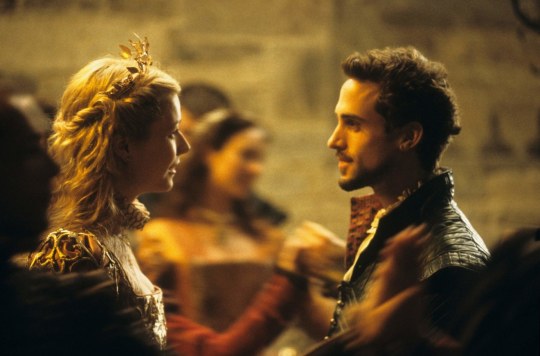
©Miramax/Courtesy Everett Collection
People forget about the competition Shakespeare faced, and we don’t mean the other plays. In the late 1500s, one could go to the theater, or one could go watch some people be executed or a bear be torn apart by dogs. That’s how entertaining Shakespeare’s work had to be! In 1998, this film competed with Saving Private Ryan, Elizabeth, and Life Is Beautiful for Best Picture and managed to come out with the Oscar. What drew the academy to the fast-paced mash-up of Romeo and Juliet with a very loosely interpreted history of William Shakespeare’s life was the film’s ability to capture exactly what Shakespeare did back in his day: the urgency of love and the power of its expression—its ability to consume us and change lives.
. . . to tell your real friends from the sham ones:
Muriel’s Wedding (1994)
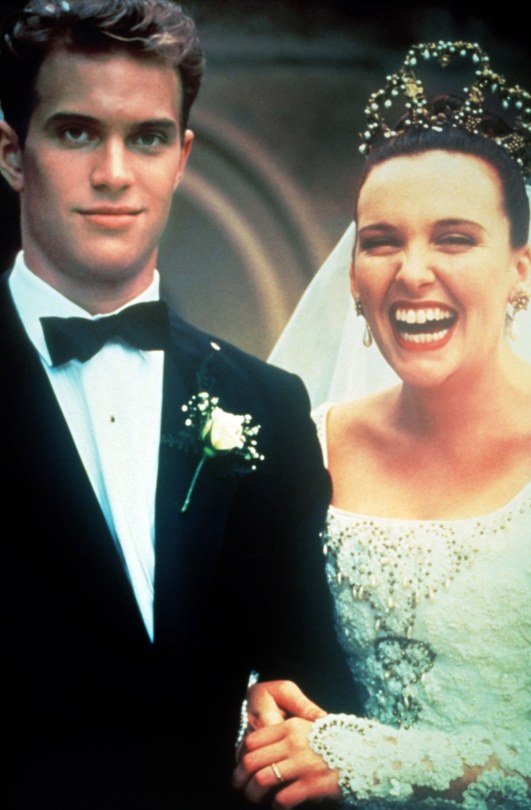
Everett Collection (13649)
Muriel (Toni Collette), a daydreamer and the target of the bitchy girls she considers her friends, wants nothing more than to get out of her small town and away from her awful father, move to Sydney, and get married. When she makes off with her parents’ savings, reunites with a fellow outcast from her town, and is offered the chance to marry a gorgeous South African swimmer who needs a visa, she can make her dreams come true. As much of a coming-of-age story as a rom-com (Muriel may be in her 20s, but she has much growing up to do), this film does a brilliant job of cutting the legs out from underneath our expectations by giving us exactly what we’ve always wanted, and tying us up in the strings attached.
. . . to relive high school (or what you wish high school was like):
To All the Boys I’ve Loved Before (2018)
Netflix’s most popular entry into the rom-com genre (based on the novel by Jenny Han) was for many an instant classic—not least for blessing the world with Peter Kavinsky (Noah Centineo), the Jake Ryan of the Internet era. Lana Condor stars as Lara Jean, a quiet high school kid who relieves her romantic pressures by writing never-to-be-mailed love letters to the objects of her affection—including her older sister’s ex-boyfriend. Until, of course, one night they get sent out. Hijinks—and a fake turned not-so-fake relationship—ensue.
. . . to remind you how much better it gets after high school:
American Pie (1999)
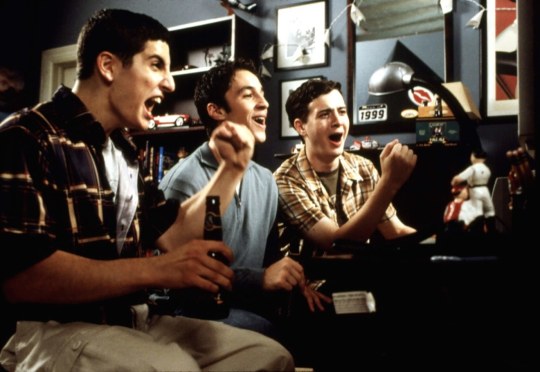
©Universal/Courtesy Everett Collection
A teen sex comedy with a heart of gold, this story of four high school friends determined to have sex before they graduate was the surprise hit of 1999. But underneath all the masturbating with pastry and accidentally ingested semen cocktails, there’s real sentiment to the adolescent boys trying to find their way with women, and vice versa. The reason we can safely call this a rom-com is that, while it doesn’t exactly pass the Bechdel test with flying colors, the objects of the guys’ affections are far from just objects. They have goals of their own we’re brought on board with. The girls aren’t just out for the boys, they’re out for themselves—as disappointingly rare in a rom-com as it is in a teen comedy, and the reason we love this one.
. . . to learn how far to take it:
Rushmore (1927)
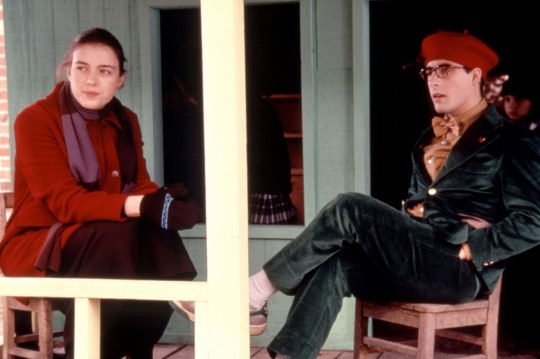
©Buena Vista Pictures/Courtesy Everett Collection
This is Wes Anderson’s most completely stylish movie, and perhaps his best, made before stylized fuckery got in the way of things like writing (like all his best work, this was cowritten with Owen Wilson). Max Fischer (Jason Schwartzman) is a scholarship student at a private school. His academics are dismal, but he’s game for any and all extracurriculars, especially the over-the-top plays he produces and directs. He gets into a contest for the affections of a widowed first grade teacher with local industrialist, and his newfound mentor, Herman Blume (Bill Murray). Several phenomenal executions come together in this film, including the ensemble cast, the just-on-this-side of believable production design, and an absolutely killer classic rock soundtrack. But what pushes it above the rest is the utter drive of both Max and Herman, as love and competition gains primacy over every aspect of their lives. They’re both willing to burn the village to save it, which is simultaneously hilarious to watch and cathartic to anyone who’s ever had a crush.
. . . to locate your other half:
Jerry Maguire (1996)
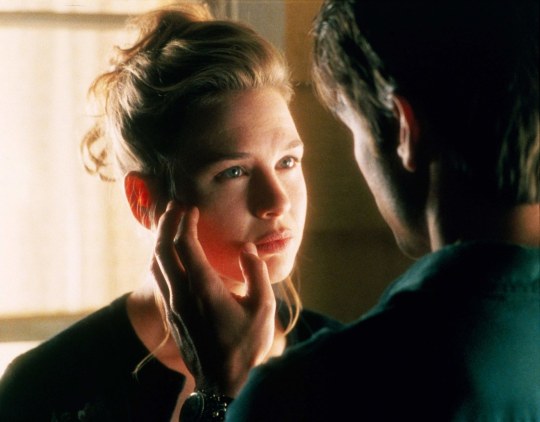
©TriStar Pictures/Courtesy Everett Collection
Cameron Crowe has a couple of films on this list (Almost Famous was close, but ultimately more coming-of-age than comedy) with good reason: He understands people and how they tick. Despite its memorably demonstrative, over-the-top lines, like “You complete me,” and “Show me the money,” this is ultimately a movie about how people really fall in love. Sure, Renée Zellweger loves Tom Cruise from the beginning—it’s a movie after all, and he is Tom Cruise—but what Jerry Maguire gets to is what happens after that first kiss, after the honeymoon period, when we have to learn about the other person as a person, and not just see them and their adorable puppy (or in this case, an adorable son, played by Jonathan Lipnicki) as an escape or alternative from our own lives.
. . . for a dose of realism (and Paris!)
Two Days in Paris (2007)
For sheer hilarious, messy, complicated realism, Two Days in Paris takes the prize. The brilliant and surprising Julie Delpy writes, directs, and stars as Marion, a young Frenchwoman who has brought her American boyfriend Jack (Adam Goldberg) to her hometown en route from a trip to Venice. They struggle through misunderstandings, language barriers, cultural clashes, encounters with Marion’s many ex-boyfriends, and her unruly parents (played by Delpy’s real-life mother and father, actors Marie Pillet and Albert Delpy,) and barely come out the other side. The moral, as Marion paraphrases Jack: “It’s not easy being in a relationship, much less to truly know the other one and accept them as they are with all their flaws and baggage.” It may not be easy, but it’s highly entertaining to watch them try.
. . . to get you through the holidays:
Love Actually (2003)

©Universal/Courtesy Everett Collection
Is this? Not really. But that’s not why we go to the movies. Love Actually is, actually, a rather clichéd Christmas rom-com, but jeez, we love it anyway. How can we not, with this ensemble cast of British romance all-stars (Hugh Grant, Emma Thompson, Liam Neeson, Colin Firth, and Keira Knightley, among others)? The prime minister (Grant) falling for a junior staff member? A quiet suitor in love with the new bride (Knightley) of his best bud (Chiwetel Ejiofor), who is apparently one of three people of color in London? A cuckolded boyfriend (Firth) rebuilding his shattered life with the help of his shy housekeeper? Balderdash. All of it. But it’s irresistible. Come on, what are you, made of stone?
. . . to fall for his funny bone:
Top Five (2014)
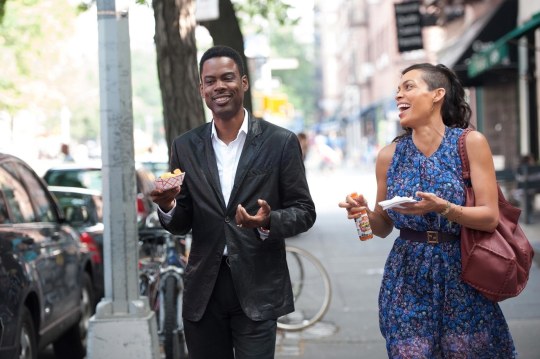
©Paramount/Courtesy Everett Collection
Think of it as Before Sunset meets Funny People, with New York taking the place of Paris. If that notion produces a little eye roll, get those peepers back down, and then on to the screen before you miss some laughs. Rosario Dawson plays a New York Times journalist tasked with interviewing a hugely famous comedian, played by Chris Rock, who is attempting to take his career in a new direction (courtesy of an ill-advised serious film about a Haitian revolutionary). Like Roman Holidaybefore it, this is a film rooted in our society’s placement of, and expectations for, certain figures (a celebrity and a princess, respectively). In both cases, the journalist finds the human being inside of their famous subject, falling for them while trying not to fall for their shtick, or what they represent. As the pair make their way through Manhattan—with visits from Jerry Seinfeld, radio hosts Opie and Anthony, Whoopi Goldberg, and a fantastic supporting job from the ageless Gabrielle Union, playing a reality TV starlet—we can’t help but get on board with their journey.
. . . to look past his neurotic, potentially mentally ill exterior:
As Good as It Gets (1997)
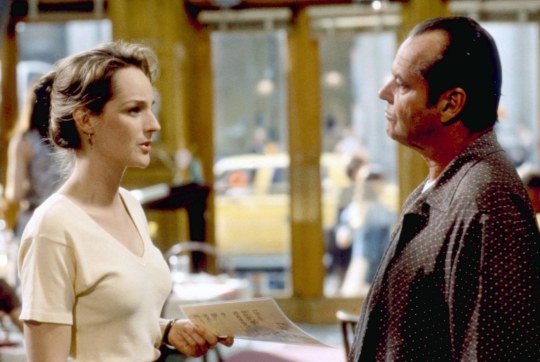
©Sony Pictures/Courtesy Everett Collection
There are few actors who can go toe-to-toe with Jack Nicholson. Director James L. Brooks found a suitable sparring partner with Shirley MacLaine in Terms of Endearment and struck gold again nearly 15 years later with Helen Hunt. Hunt plays a waitress with a sick child for whom Nicholson—a mean, racist, homophobic, obsessive-compulsive writer and her regular customer in the restaurant where she waits tables—has some affection. Bring in Nicholson’s neighbor, a gay artist (played by Greg Kinnear) who has to lean on the Nicholson’s character for help (beginning with care for his adorable dog), add a road trip, and you’ve got yourself one of the most delightful, well-thought-out comedies of the ’90s. The movie takes it time, but it’s to our benefit—Brooks allows us to get to know each of these people, and them each other, intimately, which means when the jokes, and the romance, land, they land hard, and then stay around. (Plus, who among us could resist Nicholson growling, “You make me wanna be a better man”?)
. . . to confirm that, yeah, he’s probably cheating:
Shampoo (1975)

Courtesy Everett Collection
There’s a lot going on in Shampoo—the story of an L.A. hairdresser (Warren Beatty) who is sleeping with, well, everyone (including Julie Christie, who plays a prime target of his affections)—which, at first glance, could just be another ’70s sex comedy. Keep in mind, it’s directed by Hal Ashby, the king of thoughtful, offbeat romances, and was both written by and featured, Warren Beatty, a major voice of the Hollywood Left in the 1970s. The film, released a year after Nixon’s downfall, takes place during on the eve of Nixon’s election in 1968, so there’s a good deal of interplay between the politics and the sexual politics that were in the air as the counterculture died, the pill became mainstream, and the country saw itself in a whole new, darker light. That said, Beatty’s portrayal of the harried, discursive, libidinous George is irresistible even without context, as is the performance given by a young Goldie Hawn, who illuminates every frame—and perfectly counteracts Beatty—with blonde California light, and a heart-melting, downy innocence.
. . . to get you on board with AI:
WALL-E (2008)

©Walt Disney Co./Courtesy Everett Collection
There are more epic Disney romances (one of them is on this list), but none more thoughtful. What we love about this futuristic tale of a little trash compactor, WALL-E, who falls in love with his technological better, EVE, is the considered environmental, anti-consumerist message that suffuses the dystopian love story. With barely a word, only whirrs, between them, EVE and WALL-E convincingly fall in love. His efforts to save her, once the megacorporation Buy-n-Large (their maker) comes for her, is as authentic as Hawkeye’s return for Cora, or Jack’s sacrifice for Rose. Forget Finding Nemo, this is writer-director Andrew Stanton’s Pixar masterpiece.
. . . to justify your May-December romance:
Harold and Maude (1971)

Courtesy Everett Collection
There’s a question that lingers throughout most of Harold and Maude—the story of a death-obsessed young man (he enjoys driving a hearse, attending funerals, and faking his suicide) who falls for a much, much older woman—are these two going to get it on? It sounds sophomoric, but it’s actually essential. Harold and Maude are separated by approximately 60 years; for the movie to hit home, for us to believe that love is truly about what we share, not what we look like or other aesthetic values, we have to believe a genuine attraction has formed. No one prodded existentialism (especially in films deemed “romantic”) like director Hal Ashby, and Harold and Maude is no exception. The darkly funny tale will leave you questioning just what is important to you in your own conception of love—and, moreover, in your life.
. . . to give comic books their due:
Chasing Amy (1997)
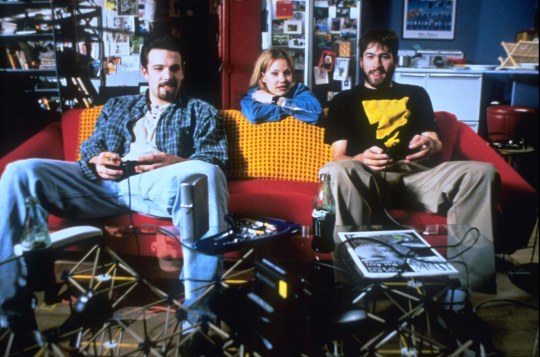
©Miramax/Courtesy Everett Collection
A comic book artist (Ben Affleck) with an inseparable best friend (Jason Lee) falls for a beautiful gay girl (Joey Lauren Adams)—who then falls for him—only to discover he can’t handle it. Comic books? Lesbian conversion? Best buds? Sounds like a romantic comedy made by men, for men. And it is! But Kevin Smith also managed a somewhat nuanced exploration of friendship and art, as well as of contemporary romantic standards in his rejiggering of the love triangle. Simultaneously, at a time when every other joke on Friends involved gay panic, he was portraying three-dimensional concepts of lesbian identity. What could be identified as a typical male-driven fantasy could also be seen as a ’90s Torrents of Spring.
. . . to make you fall in love with your friends:
Reality Bites (1994)
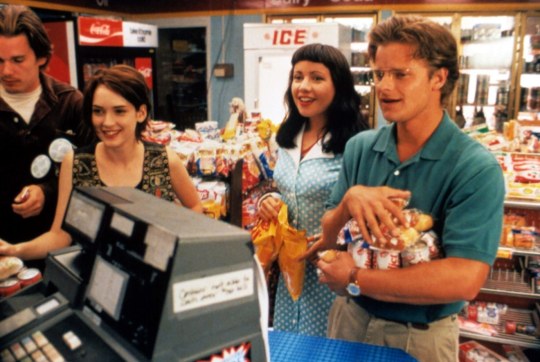
©Universal/Courtesy Everett Collection
In what was then a cult hit and is now a piece of ’90s nostalgia catnip, a post–Edward Scissorhands (and post–Johnny Depp) Winona Ryder plays Lelaina, an aspiring documentarian assisting an obnoxious TV host in Houston. She and grungy, Generation X friends—played by Steve Zahn, Janeane Garofolo, and a simmering Ethan Hawke (who may be more than just a friend)—are just trying to figure out who they are, and what they want in life. In Ben Stiller’s feature directorial debut, he also plays a TV executive whose budding romance with Lelaina and interest in her work brings the real world crashing into their postcollegiate hipster existence. Aside from a nonstop ’90s fashion buffet that is Winona’s wardrobe (mom jeans, crop tops, baby doll dresses, cardigans, men’s shirts, blazers), there’s also love and heartbreak, sex, betrayal, Lisa Loeb, Dickies, pizza, and lines like “He’s so cheesy, I can’t watch him without crackers.” What else do we want, really?
. . . to dance your troubles away:
Grease (1978)
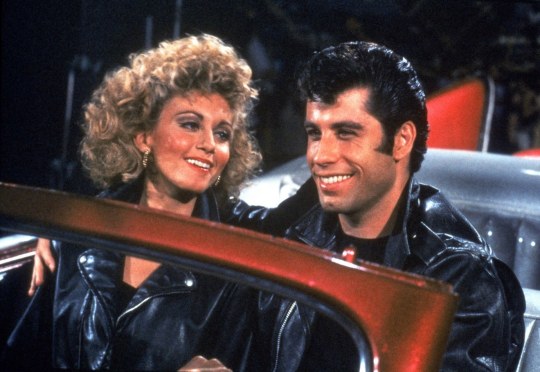
©Paramount/Courtesy Everett Collection
The ’50s nostalgia of the 1970s culminated with this unreal musical about the return to high school for summer lovers Danny Zuko (John Travolta) and Sandy Olsson (Olivia Newton-John). It’s hard for current viewers to understand just how big John Travolta was at the time; the year this film bowed, 1978, the two top-selling albums were the soundtracks to Saturday Night Fever (another Travolta film) and this one. And that was in a year when the Rolling Stones released Some Girls and Bruce Springsteen dropped Darkness on the Edge of Town. In this irresistibly playful film, Travolta embodies the bursting sexuality of the newly emerged teen culture, but at the same time, he’s a tampered-down throwback—we buy him drag racing cars and singing with his gang, the T-Birds, whose rivals are the Scorpions, and making clumsy moves at the drive-in. Similarly, the Pink Ladies, a popular clique headed by Rizzo (Stockard Channing), deliver their wiseacre lines with a fair dose of irony. These skirts know what’s up, and that’s what makes us interested, and invested, in their outcomes. We’re locked in from the first frame: There may be better musicals, but none more fun.
. . . to get you through wedding season:
Four Weddings and a Funeral (1994)
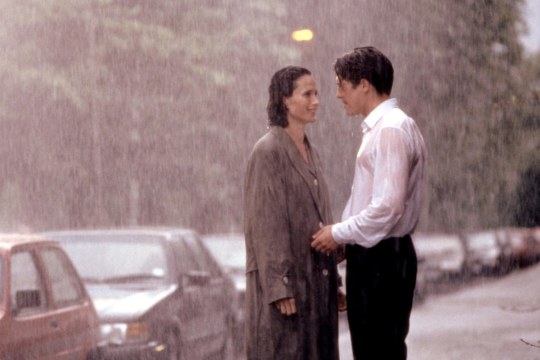
©GramercyPictures/Courtesy Everett Collection
For anyone who’s ever been encumbered by the beautiful, annoying, expensive ordeal that is a wedding, how can we not love a wedding movie whose first pages of dialogue are just the word Fuck? As much as we commiserate, this is ultimately Hugh Grant’s movie. And a little Andie MacDowell’s movie. But mostly Hugh Grant’s. It’s the film that introduced us to his stumbling, bumbling, yet confident Etonian charms and wit, which we’d witness again and again in Nine Months, Notting Hill, Music and Lyrics, About a Boy, and more). The story of Grant and his friends attending their friends’ weddings—and one funeral—perfectly captured the romance of nuptials as well as all the stress, commitment, and emotional . . . what do the British call it? . . . oh yes, bother that comes with that period in your life where your friends are tying the knot. The question this rom-com dares ask is this: In all this wedding madness, can you be the odd man out and still be happy?
. . . to find your prince:
Coming to America (1988)

©Paramount/Courtesy Everett Collection
It’s unfair that Eddie Murphy only has one entry on this list. The guy ruled the ’80s and made some of the era’s great comedies—Trading Places, Beverly Hills Cop, 48 Hrs.—but this is really the only one where the romance narrative rules supreme. In short: Murphy plays the prince of a fictional African nation who is unsure about his arranged marriage, and so heads to what he suspects will be greener pastures in search of his queen. So where better to start that Queens, New York? Essentially slumming it with his best friend (a terrific Arsenio Hall), Murphy’s character finds work at a McDonald’s-type restaurant where he falls in love with the owner’s daughter, a woman who just might fit the bill. It’s a super simple story that elicits big laughs in every scene, but it’s also a clever send-up of class and race that simultaneously owns itself as perhaps the ultimate Reaganite comedy: If you are rich and follow your heart, you can be even richer!
…remind you that life doesn’t always go as planned, but sometimes that’s okay.
Juno (2007)
Life’s not perfect, but it can be most endearing— that’s the takeaway, anyway, from Jason Reitman’s nuanced teen comedy, Juno. Ellen Page gives her breakout performance as the titular pregnant-by-accident teen who soldiers on through high school while preparing to give her baby up for adoption to a painfully needy rich couple (or “baby-starved wingnuts,” as her father calls them.) Juno’s honesty and her backward love story with the adorably nerdy Paulie (Micheal Cera) reminds us of the true meaning of being cool, and that heartache can resolve itself into a tender, resilient future.
. . . to get your boss’s job:
Working Girl (1988)

©20thCentFox/Courtesy Everett Collection
First, consider the cast: Melanie Griffith, Harrison Ford—who owned the ’80s in Hollywood and made this his only rom-com—Sigourney Weaver, Joan Cusack, Oliver Platt, Alec Baldwin (at his douchiest), and Kevin Spacey. Next, look at the director: Mike Nichols—if there is a pantheon for romantic films, he probably has Zeus’s seat. Finally, the shoulder pads; my god, the shoulder pads. Were doorways made wider in the 1980s? Adventures in Babysitting aside, this movie is really as feminist as mainstream movies got in the ’80s. Melanie Griffith plays Tess McGill, a wily business school graduate working as a secretary at an investment bank with such memorable one-liners as “I have a head for business and a bod for sin.” When her boss (Weaver) steals her idea for a merger and then ends up out of commission (temporarily bedridden after a ski accident), Tess rises to the occasion: scheming with the support of her friends and maybe-lover (Ford), conniving, flirting, and using some good old-fashioned elbow grease to outwit her superiors, beat the boys, and claim the position she’s rightfully earned. Griffith is miraculous (one critic compared her to Marilyn Monroe; younger viewers might see a mold for Alicia Silverstone’s Cher), taking a role that could have just been “cute” and elevating it to nuanced and beguiling. That’s what this film is—so much so, we’ll forgive you if, after watching it, you suddenly have a soft spot for shoulder pads.
(C)
2 notes
·
View notes
Text
Best of 2018
I watch a lot of films.
For close to five years now, I’ve been watching somewhere in the region of 100-150 new releases per year. At some point along the line, I started to keep lists of those films, then started to rank the movies on those lists, and eventually got into the habit of compiling end of year lists.
I shared these lists (and discussed them at great length in podcast form) in 2016 and 2017, and I wanted to do the same for 2018. With the Leftover Popcorn Podcast currently on an extended hiatus, that brought me to the post you’re reading right now.
Due to the quirks of global release schedules, the timing of these posts is always a little tricky. I’ve made a habit of finalising my lists just before the Oscars on an annual basis, as that generally affords the extra time required for many of the year’s most interesting films to make their way to me in Ireland.
As such, this list is comprised of my 20 favourite films that received either (a) a U.S. release in the Academy’s eligibility window for the 91st Academy Awards or (b) extremely belated releases in the UK and Ireland following late 2017 releases stateside.
Only time will reveal if 2018 was a particularly strong or interesting year for film, but I know it at least offered plenty of films that have stuck with me long after the end credits finished rolling. The year was filled with ideas, moments, shots, set-pieces and technical achievements that amazed and resonated with me in a wide variety of ways. Many of those highlights can be found in the 20 films below.
Before getting to the list, I have some honourable mentions. In no particular order, they include: Wildlife, The Favourite, Crazy Rich Asians, Hereditary, A Quiet Place, Three Identical Strangers, Beast, Shirkers, Mission: Impossible - Fallout, The Old Man and the Gun, Won’t You Be My Neighbor?, BlacKkKlansman.
20. A Star is Born - (Bradley Cooper)

The first hour of A Star is Born is as good as anything released this year and, as such, it’s by no means a criticism to say it falls off somewhat beyond that point. Still, Bradley Cooper’s directorial debut contains multiple moments that induce goosebumps. It’s not subtle by any means, but there have been very few films over the past decade that have managed to capture emotional extremes in such a truly cinematic fashion. Lady Gaga is sensational, Sam Elliott is a scene-stealer, and in the form of Cooper’s dog, Charlie*, a star is well and truly born
*In a year of fantastic canine performances, I think Charlie pips out Borras (Roma), Boris (Leave No Trace), Olivia (Widows) and Joy (Dogman) to be the best of the many good dogs.
19. Lean On Pete - (Andrew Haigh)
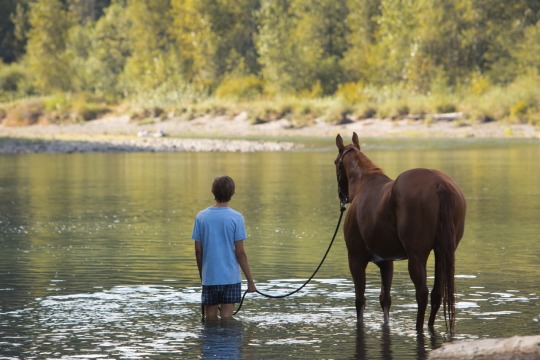
Andrew Haigh’s third feature sees the British filmmaker’s focus shift to the sumptuous expanse of rural middle America. In this touching story of a teenage boy and his attempts to save the eponymous also-ran racehorse, a delicate handle on the narrative complements stunning visuals to produce what should be the contradictory notion of an intimate epic.
It’s impossible not to fall for Charlie Plummer’s protagonist in the same fashion he has grown to love Lean On Pete, as the film’s central relationship reveals both boy and horse have equally been dealt a raw deal by their circumstances.
18. Happy New Year, Colin Burstead - (Ben Wheatley)
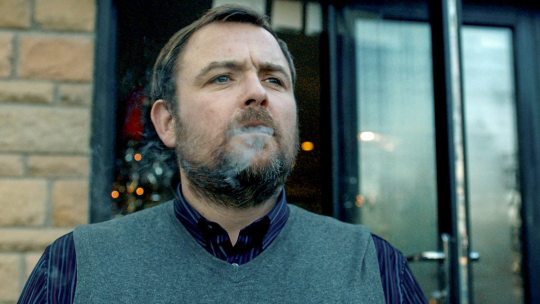
Ben Wheatley has emerged as an incredibly interesting and distinctive filmmaker over the past ten years, and that sense is only further heightened with the contained terror of the family gathering he portrays in Happy New Year, Colin Burstead. As an ensemble piece which takes place on the smallest of scales compared to High Rise and Free Fire, Wheatley’s latest was always going to live and die by its writing and acting.
Unsurprisingly, both are fantastic in a film that provides equal measures of comedy and unbearable discomfort for the audience. As an added bonus, it also includes easily the best end credits sequence of the year.
17. The Rider - (Chloe Zhao)
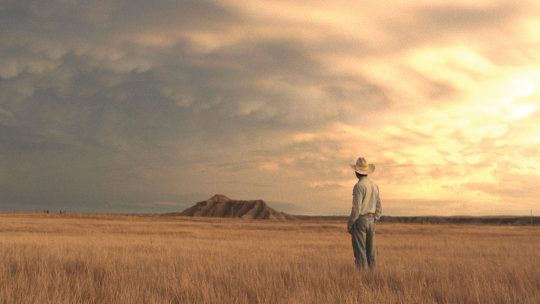
Chloe Zhao’s poetic, contemporary Western packs an abundance of heart-wrenching moments into a film that would stand as an extraordinary achievement even if it wasn’t for its real-life roots. As it is, this is more than just a film.
Although a slightly altered re-telling, the story of the Jandreau family and those who make up their social circle is brought to the screen by the real life figures in question. Zhao uses South Dakota’s largely untouched natural beauty as the canvas for this tale of struggle, and the search for purpose that unfolds from there isn’t easily forgotten.
16. You Were Never Really Here (Lynne Ramsay)
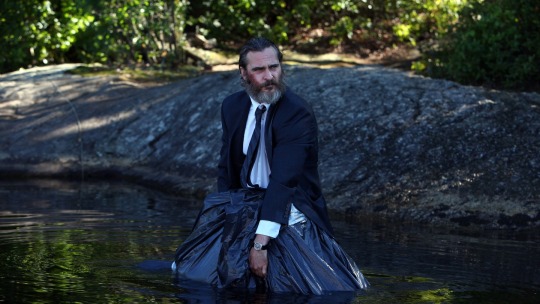
I’d be lying if I said that I liked You Were Never Really Here, which makes it something of a black sheep on a list of films that I otherwise loved across the course of the last 12 months. Some films aren’t supposed to be loved, though, and as Lynne Ramsay’s Taxi Driver-esque fable continues to rattle around my brain all these months later, I’ve come to appreciate it immensely.
This is a deeply unsettling film, but considering the subject matter, that’s exactly what it should be. Ramsay has delivered a film that showcases her masterful control of a very specific mood, and boosted by a stellar performance from Joaquin Phoenix, and Jonny Greenwood’s jolting score, it equated to one of the most memorable movies of the year.
15. Columbus - (Kogonada)
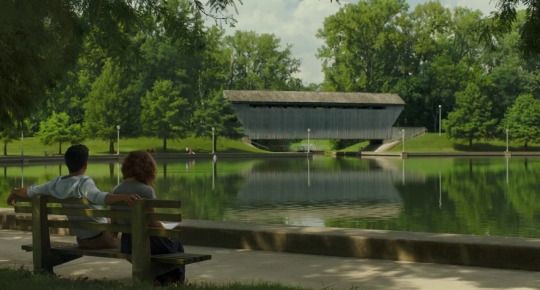
Swathes of cinephiles worldwide were already familiar with Kogonada’s cinematic tastes and sensibilities, thanks to his phenomenal video essays, but that didn’t make his feature directorial debut any less intriguing. In Columbus, Kogonada produced a film as considered as the architecture its characters swoon over.
There’s a stillness and a quiet to the film’s style and story structure, yet that doesn’t equate to a lack of heart or character depth. Haley Lu Richardson and John Cho’s sensational performances anchor the stunning visuals, ensuring their director’s own visual architecture never becomes something prosaic enough to overlook or simply pass by. This is close to as confident and assured as debut films can be.
14. Isle of Dogs - (Wes Anderson)

There’s no getting away from Wes Anderson’s particular tastes, tendencies and flourishes at this point in his career, and as a result, his work remains divisive. Having said that, as Anderson demonstrated in Fantastic Mr. Fox, animation offers an ideal medium for his ever exacting frame and the detail that populates his films. The result in this case is a visually stunning film with a wide range of charms, and something that’s undeniably its own thing in spite of the overt references to Akira Kurosawa and other Asian masters.
Beyond all of its artifice, Isle of Dogs possesses the kind of heart that critics often mourn the absence of in Anderson’s cinema. Anderson’s usual troupe of contributors also provide a fantastic voice cast, with the performances of Brian Cranston, Edward Norton, Bob Balaban, Bill Murray and Jeff Goldblum particularly lively as the film’s leading canines.
13. The Zen Diaries of Garry Shandling - (Judd Apatow)

Documentary portraits of famous figures don’t get much more complete or, indeed, interesting as Judd Apatow’s four-and-a-half hour love letter to the late Garry Shandling. Make no mistake, Apatow’s admiration for and closeness to his subject’s work is clearly evident throughout the film.
In spite of that, the film also manages to offer a look behind the curtain into Shandling’s personal life, and offer up an account of the toll that comedy and television can ultimately take on an individual. The film aligns itself with Shandling’s own clearly reflective instincts, and offers up a measured tribute which gives way to both laughs and tears.
12. The Miseducation of Cameron Post - (Desiree Akhavan)
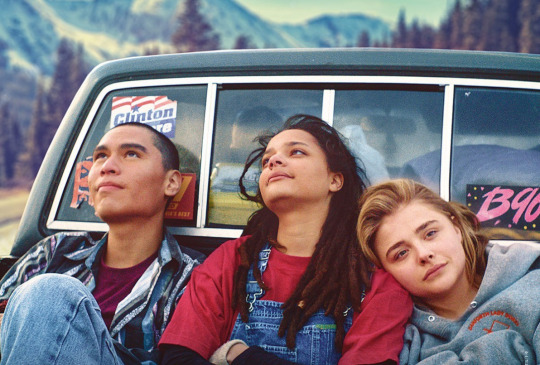
Desiree Akhavan’s second feature offers up a beautifully efficient and affecting exploration of burgeoning sexuality, and the struggles of wider society in coming to terms with that journey of sexual identity. In a year when multiple films took on a similar shape in exploring the archaic notion of gay conversion therapy centres (and on a very different subject but with a frequently similar shape, the restrictive setting of rehab facilities for addicted youth), Akhavan’s film is directed with a grace and subtlety that elevates it far beyond its contemporaries.
Chloe Grace Moretz and Sasha Lane enhance their deserved reputations as young, emerging superstars in a film that’s incredibly well-written, yet avoids the urge to rely solely on lengthy, overacted soliloquies. Instead, this is cinema as it should be. Trusting in the visual nature of the medium, Akhavan’s film is filled with lingering glances and shots, all of which reveal something about the characters and provoke further contemplation on the movie’s ever-important subject matter.
11. Widows - (Steve McQueen)

Steve McQueen’s background as a Turner Prize winning artist translated to a great sense of precision in his first three films. All three of those features, in some form or another, explored what happens when physicality is pushed to its limits, yet in Widows that same theme took on an even grittier quality when married with the conventions of heist films. A move into genre was undeniably a bold step for a filmmaker of McQueen’s style and growing reputation, but then again when he’s capable of playing with generic norms as impressively as he does in this case, it would have been a waste not to explore those possibilities.
Widows stands as a rich text layered with thoughtful assertions on class, race and gender roles, but that doesn’t detract from this story’s potential as pure entertainment either. With one of the casts of the year, the performances are exceptional across the board -- although Daniel Kaluuya’s work still stands out as one of the very best supporting turns of 2018 -- while McQueen’s inherent creativity is on display for all to see as he transforms a brief and simple car journey into one of the year’s most impressive, insightful and memorable shots.
10. Shoplifters - (Hirokazu Kore-eda)

Hirokazu Kore-eda’s tale of unconventional family on the social margins of Tokyo contains all of the trappings and warmth of Ozu’s best work, yet accompanies it with a distinctly modern and sharp edge that increases both its relevance and resonance. Deeply affecting throughout, Shoplifters highlights the often absurd nature of self-placed social constructs and norms, as just one element of a story that’s already wildly compelling, touching and urgent on its surface.
The question of nature versus nurture is very much alive and at work in Kore-eda’s film, but in a nuanced fashion that is perhaps even more interested in how society and class serve, and fail to serve, certain demographics as a whole. What’s best for us, and what can ultimately be most damaging, may be impossible to pinpoint until it’s often too late, and Kore-eda’s film is only too happy to conclude with that unknown sweeping over the audience.
9. First Man - (Damien Chazelle)
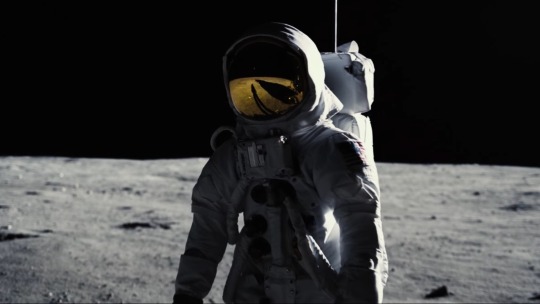
The very same elements that have led to much of the criticism of Damien Chazelle’s La La Land follow-up, will almost certainly prove to be the same reasons it will be afforded much deserved respect and acclaim in time. A very literal nuts and bolts re-telling of mankind’s greatest achievement, First Man is not all that interested in back-slapping or myth-building. It might be easier for many to imagine Neil Armstrong as an exuberant and deeply satisfied man, but his life was more complicated than that, and as such Ryan Gosling’s much-discussed, muted portrayal likely hit on the appropriate tone. Likewise, it would be nice to preserve a fairy tale image of NASA’s untouchable geniuses, but the film and the real life story is all the more interesting for wallowing in the toil, and incredible sacrifices of life, that were a part of man’s journey to the moon.
Having persevered through the quiet, rooted inner-workings and heartbreak that built up to the moon landing, Chazelle treats the audience to arguably the most spectacular moon sequence ever captured on film. The film ends having gifted a sense of wonder for Armstrong and his colleagues’ achievements, but understands the endless failures were just as central to that singular moment. Unlike much of Chazelle’s previous work, this film is not prepared to merely bow down to a narrative of genius.
8. Private Life - (Tamara Jenkins)
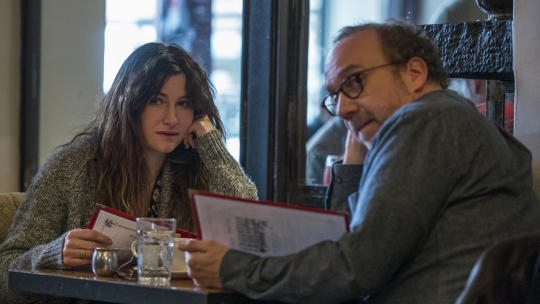
A masterclass in performance and writing from start to finish, Tamara Jenkins’ long overdue return to directing balances divergent tones throughout in a film that is jam-packed with humanity. Telling the story of a couple desperately trying everything within their power to have a child, Jenkins’ film runs through the full gamut of emotions, although it’s more than comfortable in spending prolonged spells on the extremes of uproariously hilarious and heartbreakingly crushing.
Kathryn Hahn and Paul Giamatti anchor the drama with great warmth and a genuinely believable love, while the supporting performances on the margins jump off the screen to provide no doubt as to the authenticity of this world. Private Life is the kind of intelligent and instantly relatable every day drama that rarely makes its way to the big screen any more. It’s also perhaps the strongest evidence in a long time for why cinema should be eager for these stories not to be consigned to the realm of TV drama.
7. Burning - (Lee Chang-dong)
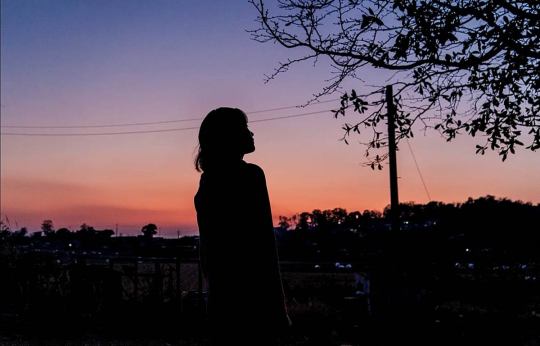
Burning is a mystery in every sense of the word. As a result, it arguably offers the purest dose of suspense that’s been seen on the big screen in quite some time. A sense of unease arises early in the film and only becomes more and more smothering as the action progresses. The lines are entirely blurred between the innocuous and ominous, and even by the film’s dramatic conclusion, for many they’ll remain equally unresolved.
In part, that’s the magic of Burning. It’s a film that not only drags the audience along with it on its journey, but displays a remarkable sense of confidence and control in doing so. The three leading performances in the film are spectacular, but Steven Yeun, in particular, is a revelation. Yeun’s Ben may be an incredibly sinister and manipulative villain, but it’s not a stretch to imagine his Gatsby-like figure being exactly who he presents himself as too. The film must be considered through the prism of the literary aspirations of its protagonist, Jong-su, and that creates valid suspicion. Regardless, Burning is an exquisitely crafted psychological drama and examination of social status along the Korean border, with equally stunning visuals to match.
6. Cold War - (Pawel Pawlikowski)

Inspired by his own parents’ love story, Pawel Pawlikowski took the intimate framing and crisp black and white of his Academy Award winning Ida, and applied it beautifully to a sweeping, European romance. Such is the power of cinema that Cold War feels truly epic. That’s all the more impressive considering it’s a deeply personal story captured in close quarters, which also zips in at a notably punchy 85-minute run time.
Combined with Lukasz Zal’s phenomenal cinematography, it’s clear that Pawlikowski has crafted a winning style. Still, the story is essential in providing the substance and, in this case, it’s thoroughly engrossing. Joanna Kulig is truly magnetic as the single-minded and enigmatic Zula, while Tomasz Kot carries himself with the effortless charisma and dignity of the archetypal, classic leading man as he embodies Wiktor. Every frame in the film would look at home in an art gallery, and yet Cold War carries memorable moments of substance beyond its aesthetic pleasures. Just as important to mention is the fact I never knew I needed Eastern European folk music in my life, and then this film’s enchanting songs took up permanent residence in my head.
5. Roma - (Alfonso Cuaron)

A true cinematic master, Alfonso Cuaron combined the bracing humanity of Y Tu Mamá También with the technical mastery of Children of Men to produce the most personal film of his career. In that regard, Roma may well live on to be viewed as Cuaron’s truly definitive work. This film captures the spirit that infuses his wider filmography with so much exuberance and life, while telling a story that has so much resonance in its own right.
A tribute to the childhood maid that raised him, Roma shines a light on the struggles of indigenous Mexican people, and the class and cultural divides that have long existed in Mexico City. Driven by an outstanding, naturalistic performance from first-time actress Yalitza Aparicio as Cleo, the film’s deliberate pacing provides the audience with the truest sense of the world in which its set, and the routines of its protagonist. Of course, it does this in a fashion which few other living filmmakers could dream of replicating. Cuaron’s camerawork is out of this world, particularly in the film’s two main set pieces, but just as relevant to the discussion that surrounded its Netflix release was the remarkably immersive sound design. I was lucky enough to catch Roma on the big screen, and there’s no doubt that it made the film an even greater cinematic spectacle. Having said that, the emotion at the heart of the film is deeply affecting, and it will therefore connect on screens of all shapes and sizes for decades to come.
4. If Beale Street Could Talk - (Barry Jenkins)
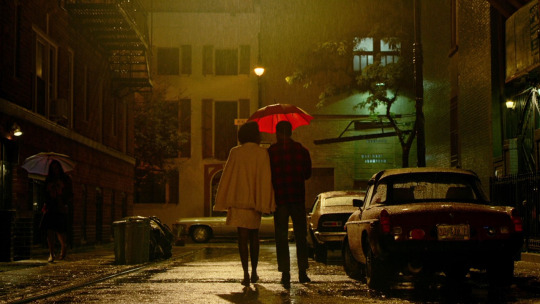
If Beale Street Could Talk is not only Barry Jenkins’ first film since his Oscar win for Moonlight, but it’s also the first English-language adaptation of a James Baldwin work. Combined, those elements make for an enormous weight of pressure and expectation, and yet Jenkins was more than up to the challenge of delivering beyond even the loftiest of expectations. Much like Moonlight, this is a perfect match of filmmaker and subject matter. Jenkins is undeniably ascending toward the status of being the premier cinematic chronicler of the African American experience. It’s particularly vital for that specific lens to his work to never be overlooked, either, as it gets right to the heart of the essential truths of his films.
Still, it all derives from a deeper understanding of emotion, society and relationships that ensure Jenkins’ cinema is also imbued with a layer of universality. Jenkins is a filmmaker of great empathy, and his collaborations with cinematographer James Laxton have seen him develop into the modern master of the close-up. Faces have rarely looked as rich and expressive as they do under Jenkins’ gaze, and it’s likely no coincidence that actors seem to find another gear for their performances under his watch. For this film, those elements all combine for a story rich with romance and tragedy, and one that’s sadly as relevant today as it was when Baldwin published the novel in 1974. To cap things off, Nicholas Britell’s score finds the most extraordinary balance between soaring romance and Herrmann-esque dread to emerge as cinema’s best soundtrack of the year.
3. Leave No Trace - (Debra Granik)
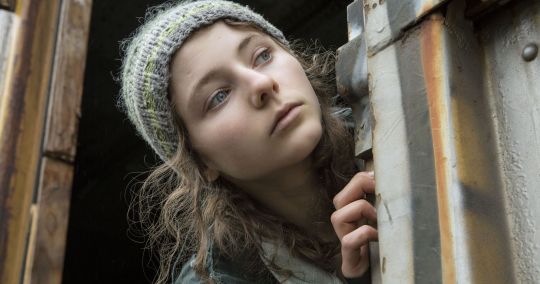
Debra Granik returns with her first feature since Winter’s Bone effectively launched Jennifer Lawrence’s career, and it was undoubtedly worth the wait. A quiet film with an ultimately pointed and heartbreaking message, Leave No Trace affords the leafy green environs of the Pacific Northwest the kind of breathing space society seems so unwilling to offer the film’s father and daughter duo.
Played by Ben Foster and Thomasin McKenzie respectively, there’s an arresting resilience and tenderness to the central relationship of Will and Tom. Living in public parks and deserted woodlands, Will and Tom don’t conform to the cut and dry definitions of family and home that the authorities around them are intent on enforcing upon them. Part of the magic of Granik’s film comes in the way it gradually channels the viewer to see things from their perspective. Why can’t contented people, doing no harm to others, be allowed to live in a manner of their choosing? Of course, the conversation is much more complex of that, and so, as Granik’s film ultimately reveals, is the telling of it in this case. On the whole, Leave No Trace is a truly mesmeric meditation on the impact of trauma, familial love and societal norms. Buoyed by McKenzie, who delivers one of the most astonishing performances of the year, it’s not a film that can be easily forgotten.
2. Minding the Gap - (Bing Liu)

It’s become unsurprisingly fashionable for American cinema to attempt to explain the ascendance of Trump, and the country’s wider social challenges, with on the nose films that offer minimal real depth or insight. Minding the Gap doesn’t fall into those same traps, though, largely because it seems like it never originally had aspirations to be as profound as it ultimately proved to be. As it turns out, simply charting the lives of a group of skateboarding friends over an extended period of time provides a fascinating look into the struggles of youth, and the baggage of history and circumstance, in small, forgotten towns.
Directed by Bing Liu, one of the aforementioned skateboarders, Minding the Gap’s subject matter ultimately proves to be remarkably complex and far-reaching for a 93-minute documentary set on the streets and in the homes of Rockford, Illinois. The young men’s interconnected lives ultimately give way to a shared history of previously undiscussed struggles. Among the young men’s commonalities are exposure to domestic abuse, experiences shaped by race, immense financial struggle, the confusion of modern masculinity, and, of course, a passion for skateboarding. There’s certainly some optimism to be found here, but there’s also an overwhelming sense of sadness for how these young men have been shaped by past acts and histories that were always beyond their control. If you wanted to even try to explain America in 2019, understanding those challenges would be essential. In truth, though, the same difficulties could be applied, and used as explainers for social issues, across the wider Western world. This is a deeply human story and, I’d argue, the year’s most touching film.
1. First Reformed - (Paul Schrader)
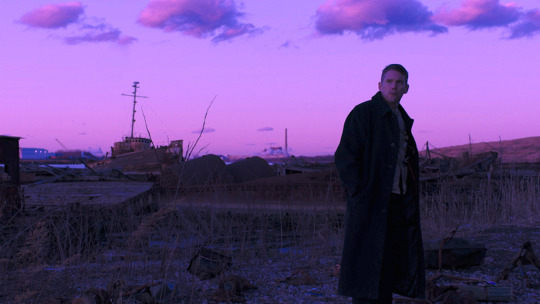
I’m not sure how many people were expecting it, but at 72-years-old, Paul Schrader remains one of cinema’s most vital and striking voices. With a deep well of cinematic knowledge to draw from, First Reformed sees Schrader borrow liberally from many of the form’s great masters, while still crafting an incredible story that is undeniably spoken in his own abrasive tone. Bergman’s Winter Light, Dreyer’s Ordet and Bresson’s Diary of a Country Priest are blatantly obvious inspirations, but the voice of Taxi Driver’s Travis Bickle, Schrader’s own most famous creation, is equally present in the character of Reverend Ernst Toller.
Toller is played masterfully by Ethan Hawke in the best performance of what’s already been a rich and fascinating career. A clearly measured and reasonable man, Toller’s journey ultimately brings him to breaking point as those around him ignore his message in the same way that he attempts to turn a blind eye to his ailing health. Schrader’s writing tackles global warming, and the prospect of impending doom that accompanies it, in the kind of blunt and unflinching terms that should now be unavoidable but tragically remains all too rare. By the same token, as Toller begs for consideration of whether God can forgive for the damage done to the earth, his preachings fall on the deaf ears of an immensely selfish world. In Schrader’s mind, there’s no question that drastic times call for drastic measures.
Even with such an urgent message, a fantastic script, and a generational lead performance, First Reformed wouldn’t be as great as it is without its stunning array of visuals. The film’s visual treats range from extreme close-ups that make a map out of Hawke’s wrinkled forehead, to the electric and lustrous pink of Toller’s heartburn medicine as it mixes with his whiskey, and to the vivid anger of the early morning sky. Quite simply, it’s a feast for the eyes, a jolt for the mind, and an assault on the soul.
#film#movies#cinema#oscars#first reformed#minding the gap#leave no trace#if beale street could talk#roma#cold war#burning#first man#shoplifters#private life#widows#the miseducation of cameron post#the zen diaries of garry shandling#isle of dogs#columbus#you were never really here#the rider#lean on pete#happy new year colin burstead#a star is born
1 note
·
View note
Text
The Hollywood Bowl: Where Angelinos Celebrate Summer
It is summer in Hollywood. Except it is not. Most entertainment venues are closed. Movie theaters sit empty. There are few tourists ogling the Walk of Fame and the newly created Black Lives Matter street mural on Hollywood Boulevard. Musso and Frank’s has launched take out service. Masks are no longer just for superhero characters busking in the courtyard of the Chinese Theatre. Social distancing is the current norm.
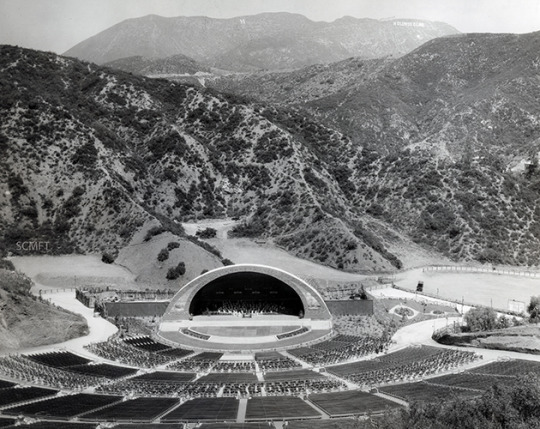
The strange sense of “life suspended” is felt most deeply by the cancellation of the Hollywood Bowl season. The venue has not been dark during its summer season in more than 98 years; the official centennial will be marked in 2022 (something to look forward to). The Bowl IS summer in Hollywood: every style of music on the planet, picnics, fireworks, graduations, and dates under the stars. My mood lifts the minute I enter its gates, and I know I’m not alone. Music-filled air in an outdoor amphitheater in the wooded Cahuenga Pass with a (sometime) view of the Hollywood Sign. It just does not get much better.
What better time to pause and reflect on just what a community achievement the Bowl has been. Over 100 years ago, the Hollywood community was just beginning to create a vision of what it wanted to be: a place known for the visual and performing arts worldwide. Outdoor venues played a role from the start. At the turn of the century, Paul de Longpres’ gallery and gardens set the tone for art in Hollywood. Creators of a relatively new art form called “motion pictures” chose Hollywood as their base. Legitimate theater productions and opulent religiously themed pageants were developed; the casts were often actors from the New York stage transplanted to the West Coast to work in the movies. Hollywood formed a chorale and a local orchestra. By the end of World War I, Hollywood had been a part of the City of Los Angeles for less than a decade. Its population of affluent, educated transplants from the Midwest and East Coast needed to be entertained. Music was key.
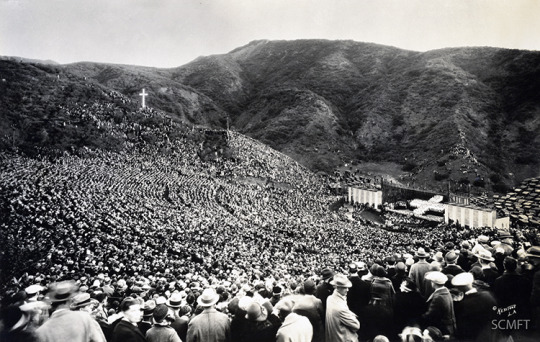
In 1918, a patron of the arts from Philadelphia, Christine Wetherill Stevenson, came to Southern California to produce performances of Light of Asia, written by Sir Edwin Arnold and adapted by Hollywood resident, Georgina Wharton Jones. Stevenson, an ardent member of the Theosophical Society, whose local chapter was headquartered on Krotona Hill in Hollywood, demonstrated with the production that theatrical performances outdoors were feasible and valued. In collaboration with local leaders, including poet and songwriter Carrie Jacobs Bond, director DW Griffith, developer CE Toberman, Marie Rankin Clarke and a host of others, she formed the Theater Arts Alliance and began searching for a location with superior acoustics. In the canyon just north of the Hollywood Hotel, Toberman found parcels owned by Myra Hershey, the hotel’s proprietor, and several others which fit the bill. More than 50 acres were assembled; the funds came from Mrs. Stevenson and Mrs. Clarke on behalf of the Alliance. Differences of opinion soon arose about the use of the venue, originally known as Daisy Dell.
Mrs. Stevenson wanted the site for Theosophical events while most others wanted it used for musical purposes. By 1920, Mrs. Stevenson became disenchanted with the concept, the perceived slowness of fundraising, and left the project. The Arts Alliance was dissolved and replaced by the Community Park and Art Association, consisting of many of the same players. They were joined by community and music leaders FW Blanchard, William Merritt Garland, Harry Chandler, George Eastman, architect Frank Meline, and pianist Artie Mason Carter. Carter, a “good mixer and organizer” according to EO Palmer, took the lead, organizing an Easter Sunrise service in 1921 and began “Symphonies Under the Stars” with world renowned musicians which quickly drew audiences of 15,000 by 1925. The first stage elements built in 1922-23 were rudimentary, but the offerings were diverse. Local Native Americans continued to use the site for various events. Prices started at 25 cents.

The 60 acres of land was transferred to the County of Los Angeles in 1924, forming a partnership which allowed Allied Architects to put in more permanent seating and stage infrastructure. Bench seating, box seats, and various configurations of the stage evolved through the years. Capacity was increased, but degraded the acoustics, a problem that recurred well into this century. Architect Lloyd Wright designed a pyramidal shell from lumber originally used in the sets of Robin Hood in 1927. That lasted only a year, so Wright followed up with an arched shape of concentric rings the next year, variations of which became the norm for future designs as the shells were replaced in 1929 and again in 2003. A reflecting pool graced the front of the stage from 1953-1972. At the entrance on Highland Avenue stands the monumental Muse Fountain by George Stanley. Picnic and parking areas, a museum and restaurants are also tucked into the wooded site.

Featured in A Star is Born (1937), Double Indemnity (1944), Tom and Jerry and Bugs Bunny cartoons, not to mention countless other TV and films, right up to today’s NBC family drama This is Us, the location is a star in its own right. It quickly became a goal of every major performer in classical, jazz, rock, punk, rap and international music to play the Bowl. Beginning with performances by violinist Jascha Heifitz, jazz great Benny Goodman, Frank Sinatra, and Marian Anderson, the Bowl gained worldwide renown by the 1950s. A financial crisis closed the venue for two weeks in 1951 while the Board regrouped with new leaders including Dorothy Buffum Chandler.
The parade of luminaries soon continued with Nat King Cole, Peggy Lee, Van Cliburn, Ella Fitzgerald, and Louis Armstrong. The ‘60s saw rock ‘n roll added to the classical musical lineup of the Hollywood Bowl Symphony, featuring tunes by the Beatles, the Beach Boys, Bob Dylan, and the Rolling Stones. Subsequent decades also hosted Santana, the Grateful Dead, The Eagles, Elton John, as well as YoYo Ma, Pavarotti, John Williams, Baryshnikov, Willie Nelson, the Dixie Chicks, and Lady Gaga with Tony Bennett. Broadway musicals were adapted; movies projected on huge screens brought the medium full circle. “The talent onstage has changed, but the audience relationship with the Bowl has remained constant—one year stretching into the next, until the parade of time can be marked by shared moments in this place,” wrote one LA Times writer earlier this year.
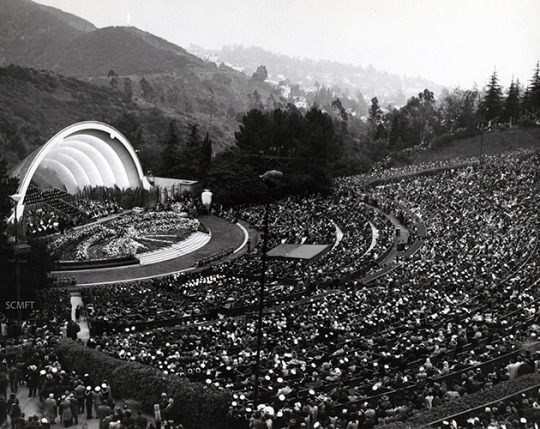
We look forward to the time when the canyon will once again echo with music, when fireworks and performances awe, and friends gather over picnics and wine in this unrivaled cultural facility. In the meantime, a trip through our photo collection of the Bowl will have to tide you over, along with the virtual presentations planned by Gustavo Dudamel on KCET/PBS starting August 19th. Six episodes composed of past performances will constitute “the 2020 season.” And you better believe, it ends with fireworks.
~ Christy McAvoy, Historic Hollywood Photographs
Sources: Bruce Torrence archives; EO Palmer; The LA Times; In Concert at the Hollywood Bowl website
#historic hollywood photographs#hollywood#hollywood bowl#concert venues#music#amphitheaters#cahuenga pass#highland avenue#history
0 notes
Text
A Slap On The Wrist or A Pat On The Back: The 90th Academy Awards
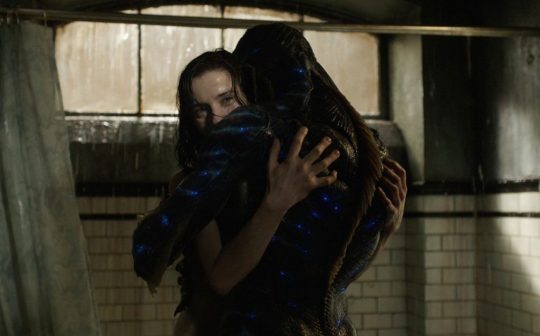
The Oscars is, in a way, a perverse thing to follow. If you are serious about film then you know it’s not good for you. Yes, the politics. Yes, the tackiness. Yes, the phoniness of it all. However, the Oscars feed my unbearable smug sense of opinionated satisfaction. Like the Grammy’s, the Oscars usually pick winners according to their populist appeal, or who Harvey Weinstein happened to lobby for. But then again, the mood has changed and the self- congratulatory tone of Hollywood is under more scrutiny than it arguably has ever been. It’s not going to be enough to throw around a Kevin Spacey joke, there is going to have to be a careful acknowledgement about what needs to change.
Whilst that is going on, I would like to provide a quick throwaway roundup of this year’s main categories. The focus is on the big six – Picture, Director, Actress, Actor, Supporting Actress, and Supporting Actor. Unfortunately, the awards are set to a US release schedule. So whereas I’ve seen Loveless and The Square, I haven’t seen the three other nominees in the Best Foreign Language category.
Best Picture
Ever since the Academy decided to increase the nominees from five to nine or ten, there has been a greater chance to pick a number of films which don’t belong. Thank goodness there is only one this year: Darkest Hour. A broad historical drama which looks more suited for the BBC Original Drama slot on a Sunday evening. The other nominees range from timely offerings (The Post, Three Billboards Outside Ebbing, Missouri, Get Out), tender coming-of-age (Lady Bird, Call Me By Your Name) and filmmaking masterclasses (Phantom Thread, The Shape of Water, Dunkirk).
The gist is that this is between two frontrunners: Three Billboards and The Shape of Water. My personal gripe is that Three Billboards has been misconstrued as the ‘transgressor entry’ this year. Unlike what many commentators pointed out, I don’t think its attitude to race is the problem. The problem with Three Billboards is that too often, it likes to eat its cake. Too bad, because it has a message worth exploring. Instead, I think Get Out should’ve taken the mantle. It has more bite and wit to its social commentary, as well as being devilishly funny.
Three Billboards has dominated the Golden Globes and the BAFTAs, but I have a feeling The Shape of Water will edge it. It won at the Producers Guild Award for Best Film – which is usually a solid indicator for Best Picture – and lets not forget how we all thought La La Land was going to sweep the board
during award season, only to be pipped to the post by Moonlight. The point is the Oscars haven’t always been complicit with its forerunners.
If there is any outside heat come the night, it will most likely come from Lady Bird. My personal picks are split into two categories: the Best Film and the Defining Film of the Year. The exquisite and thrilling Phantom Thread for the former, and Get Out for the latter. Academy voters, if you want to make a genuinely interesting and deserving pick, pick Get Out.
Will Win: The Shape of Water Should Win: Phantom Thread Missed Out: The Florida Project
Best Director
One cannot put a finger wrong with the nominees in this year’s director category. Whatever you may think about Dunkirk – and it admittedly did leave me a bit cold - it has been directed within every inch. Christopher Nolan’s time will undoubtedly come, but he was just shy of making a truly great film. Plus, he has got to contend with Guillermo Del Toro for The Shape of Water. It’s hard to ignore the labour of love Del Toro has put into it, even if it’s a sum of a lot of elements he has explored before.
Otherwise, Greta Gerwig does a tactful job of directing the coming-of-age qualities of Lady Bird, and Jordon Peele brings a cracking intelligence to Get Out. The one nomination that niggles me the most is Paul Thomas Anderson for Phantom Thread. It’s probably because he has more discreetness to his mastery compared to the others, but moreover, he is in a different league. Therefore, he has the least chance. Go figure.
Will Win: Guillermo Del Toro (The Shape of Water) Should Win: Paul Thomas Anderson (Phantom Thread) Missed Out: Dees Rees (Mudbound)
Best Actress
For all my doubts about Three Billboards, everyone seems to be in agreement about one thing: Frances McDormand. I will go as far as to say she gives that film a lot more distance than it probably should’ve got. The
closest competition to her is between Sally Hawkins for her dexterous performance in The Shape of Water, and the faultless Saorise Ronan for Lady Bird. Both actors put themselves wholeheartedly behind two very personal projects.
Margot Robbie also deserves plaudits for her ferocious turn in I, Tonya. It’s a performance that is commanding, brimming with energy, but most of all it’s exhausting to take in. It’s a pity she is in a tough company of actors at the top of their game. Save for Meryl Streep with her serviceable presence in The Post.
Will Win: Frances McDormand (Three Billboards Outside Ebbing, Missouri) Should Win: Margot Robbie (I, Tonya)
Missed Out: Kristen Stewart (Personal Shopper)
Best Actor
Darkest Hour was built around showcasing one performance, and that obviously was Gary Oldman. So the Paul Newman award for Great Actor- Wrong Film (Best Actor) will go to him without a doubt. Ok fine, I’m being a bit snooty, but I’ll be damned if his Winston Churchill was the most affective performance out of the five nominees. Oldman puts his all into portraying the gargantuan politician, but it’s too tailor-made for the award circuit.
In my opinion, two performances stand out based on skill and insight. I’ll state the obvious: Daniel Day-Lewis is fantastic. More than that, it might be one of the best performances he’s turned in since In The Name of the Father. Better than his Lincoln, better than his Bill The Butter, maybe even better than his Daniel Plainview. The other is Timothée Chalamet for his part in Call Me By Your Name, which exudes intellect and heartbreak.
Will Win: Gary Oldman (Darkest Hour)
Should Win: Daniel Day-Lewis (Phantom Thread) Missed Out: Robert Pattinson (Good Time)
Best Supporting Actress
Again, it’s another tough category full of impeccable acting. I’d like to think this is as close as it was a month ago, but after the BAFTAs it looks like
Allison Janney will win out. Make no mistake; she brings out the toxicity as Tonya’s mother in I, Tonya. It’s a role so loud that it casts a shadow on the rest. Laurie Metcalf is wonderful as an exasperated mother trying to bring out “the best version” of her daughter in Lady Bird. Pretty much the central mother-daughter dynamic is what makes the film work so well. I think the Academy will underestimate that.
Out on the left field, Leslie Manville is on sniping form as a lurking overseer in Phantom Thread. It’s this years Mrs. Danvers. Octavia Spencer has a more grounded presence in The Shape of Water – which is much needed in retrospect. Finally, Mary J. Blige gives an impressive performance full of motherly strife in Mudbound.
Will Win: Allison Janney (I, Tonya) Should Win: Laurie Metcalf (Lady Bird) Missed Out: Tiffany Haddish (Girls Trip)
Best Supporting Actor
The presence of two supporting actors from Three Billboards, hammers home my earlier point about actors propping up a meretricious script. Sam Rockwell injects a captivating layer to his character, and Woody Harrelson is perfectly droll. This only leaves three other nominees. Christopher Plummer’s nomination is more like a frank acknowledgement for stepping in at the last minute (he replaced Kevin Spacey), and Richard Jenkins plays his role in The Shape of Water in a delicate manner.
However, this should be Willem Dafoe’s year. Not many American actors commit themselves in switching between mainstream and art-house, on a regular basis, quite like Dafoe. Whether it is European cinema (Pasolini, Antichrist, The Dust of Time), American Cult Cinema (Wild At Heart, Auto Focus, American Psycho) or Blockbusters (Spider-Man, The Fault In Our Stars, Speed 2). Need I say more? As a stringent, but caring janitor in The Florida Project he blends excellently into the flaky backdrop of a motel.
Will Win: Sam Rockwell (Three Billboards Outside Ebbing, Missouri) Should Win: Willem Dafoe (The Florida Project)
Missed Out: Hugh Grant (Paddington 2)
1 note
·
View note
Text
Cats Antwerp - 30th March 2017
Ahhhh OK. So, the good bits are very very good indeed! This show tho. For a start, it's not so much a theatre as a building site, that will hopefully soon become a concert hall. Literally, coils of electrical cable on the stairs front of house. And backstage is worse -the place is full of construction dust. It's literally pulling the cast out sick, everyone's coughing and losing their voices. Disastrous. Also they can't use the fly tower tonight, so no Misto rope, plan B heaviside layer. Now I might be imagining things but I think Rumpleteazer WAS in jellicle songs, but she certainly wasn't in the rest of the opening numbers. But mungo and jemima covered by announcing tugger, which worked nicely having various kittens excited to see him. By the time we actually got to mungo and Rumpleteazer, she turned up, and from then on it was all fine. Dane was mungo, Alice Cornwall was Rumpleteazer. Tugger though! This was Nathan Johnson covering for Pepé Munoz, and he was so fluffy and pretty! Slight air of swing about him, not 100% owning the role, but I was more than happy. Jennyanydots - Joanne Lee Martin, loved her bouncy energy! They've had a knack of finding good Gumbie Cats recently, and she's not letting anyone down. Also she has new costumes, her house coat is plush and round, and her tap is so rich and fringes! Still find the new tap painfully dull. Grizabella- ohhhh boy the new costume is not flattering. Jo Ampil is not particularly tall, but that costume is so far from anything remotely glamorous on her. Not kind. Possibly that distracted me, but I didn't connect with her grizabella the way I have done in the past. Bustopher has a red flower again! Jenny's gorgeous in this number,and also I had been afraid of new material in there, fortunately not. Munkus picked up bill in a manner I find very familiar of removing the naughty cat from where he's not meant to be and putting him in place! Old Deuteronomy-the number gave me a chance to really appreciate having tugger back! As for John Ellis, I think the working conditions were really getting to his voice, he was not on top form at all. Also, his young deut top is all lovely and plush velour, but its a good 4" too long and the hem is on a pale flat line, it needs a trim to blend into the trousers too. OK, then when we should have got to Pekes and Pollicles is when things started going wrong. we got right up to the start of "of the awful battle...." when we get a macavity crash, then the weird and tonally clashing bit of loosely paraphrased macavity. Didn't seem necessary. Then "jellicle cats come back, come all" to start the jellicle ball. the energy was wrong for the intro but then the show was all over the place. The ball itself was amazing, all pulled together and again, tugger back was so good! Front of house was so unorganised too, no one controlling people flow at the interval getting up onstage with old Deuteronomy. And audience so slow to come back. Moments of happiness- vocal difficulties but to be fair, under the circumstances, forgivable. Gus. Things got interesting. OK Charlotte Scott as jelly is gorgeous. Tony magill as Gus, got a proper wig back! Not a particularly frail Gus. Had whole ensemble playing about much longer, no costume changes. Pekes and Pollicles. On one hand, pretty fun, on the other, kills Gus. Literally kills any emotional pull of the character. Do not care about him. Not sure why he needed to go off stage to don his trash robe. Nobody wins from this change around apart from the running order making the show Slightly shorter. I was enjoying it as it was going on but the absolute lack of tragedy about his character means I don't care. He's an actor in his 40s not as active as he used to be, not in his 80s frail and ancient. I didn't hate the arrangement, didn't even miss Growltiger, but having a hale and lively Gus, with no reprise of his song, just finish his number and leave, absolute disaster. Skimbleshanks! Always reliable to lift the the mood! Joe Henry was covering, and fun, great ensemble number. Tugger around more than usual. Because - possibly just due to this theatre- only one decoy macavity. Macavity song - Agnes pure as Demeter was skittish and twitchy, the only possible criticism was the she was mumbling her lyrics. most of the audience may not be native English speakers but you still need to enunciate! Charlie Johnson as bomba was gorgeous, all slinky and smokey, lovely moments of catting about through the show too with washing and combing her hair... I don't know if there's new orchestrations, band problems,sound levels or what, but the sound and timing on macavity fight was all off, especially ending up with alonzo standing around waiting his turn. They all fought through, and the throws were magnificent, wonderfully scary macavity. Misto! Love! Shiny and sparkly! I lost count, 29 or 30 spins, long time since I've seen Misto manage that. And he's so bright and cute. And the new jacket has subtly colour changing lights, controlled from the lighting board, and he's covered in AB crystals so all the sparkly rainbows. To the end of the show - again, no flying, vocal difficulties for old Deuteronomy, disconnect from grizabella, wonderful character moments in the ensemble. Mungo and Rumpleteazer touching hands mirroring grizabella and vic! Alonzo and Cassandra beautiful elegant sync, as much as the twins. Sophia mcavoy is a gorgeous Vic, just everything you want. Grace swaby as jemima, hit every Mark, would likely shine more in a show with fewer problems, everyone else rightly adores enric marimon and Aaron hunt as carby and bill. Jak anderson beautiful Admetus, scary mac. Ohhhh, extra music for grizabella has been cut, phew. So there's a really solid cast, rockstar tugger, and new material that fails so hard. And Gus is nerfed. But tugger is back!
14 notes
·
View notes
Text
words i liked from “Letters of Note”
In which I spent 2 hours compiling my favorite quotes from the books “Letters of Note” - a collection of letters sent from famous, regular, and famous-but-only-in-select-groups people. This is mostly just so I have a place where they’re saved but also because this blog is basically “stuff i like” so. yes. anyway. if you like old things and are interested in people you’ll probably like this.
As long as there is one upright man, as long as there is one compassionate woman, the contagion may spread and the scene is not desolate - E.B. White in response to Mr Nadeau’s letter about the future seaming bleak and hopeless to him (1973). pretty standard stuff really but in context it is better
I must write a special letter and thankyou for the dream in the bottle [...]. Tonight I shall go down to the village and blow it through the bedroom window of some sleeping child and see if it works - Roald Dahl to Amy Corcoran in response to her letter about her love for the book, 'The BFG', and a bottle she sent inside which she put a painting of one of her dreams (1989)
Say howdy to George Carter, and thank him for taking the pistol from you when you were shooting at me - from Jourdan Anderson to Patrick Henry Anderson when the latter asked him to return and become his slave again, trying to tempt him by offering him ‘more freedom’, despite the fact that after Jourdan fled from him he had a much better life and a happier family (1865). Jourdan refused to go back unless a list of his demands were met - they were not.
*The entire letter Hunter S. Thompson sent to Hume Logan in response to the latter's request for some life advice which is too big to put here*
Dear sirs, I see that you are going to make all sorts of excuses to keep my child out of public schools. Dear sirs, will you please to tell me! Is it a disgrace to be born a chinese? Didn't God make us all!! - a rightfully enraged Mary Tape to the San Francisco board of education when they would not let her daughter attend school because of her Chinese descent (1885)
It is only adults who ever feel threatened - Ursula Nordstrom to a school librarian after hearing that the latter banned and later burned Maurice Sendrak's (her client) children's book, “In the Night Kitchen”. (1972)
A motion picture projector is a non humanoid robot which repeats truths we inject into it. Is it inhuman? Yes. Does it project human truths to humanize us more often that not? Yes. The excuse could be made that we should burn all books because some books are dreadful. We should mash all cars because some cars get in accidents because of the people driving them. We should burn down all theaters in the world because some films are trash.. drivel. So it is finally with the robots you say you fear. Why fear something? Why not create with it? - Ray Bradbury to Brian Sibley in response to the latter's letter about his fear of robots (1974)
Not believe in Santa Claus! You might as well not believe in fairies! - from the editor of the Sun to 8 year old Virginia O'Hanlon, in response to her question about Santa Claus being real. It's a nice letter (1897)
Sir, I have just written you a long letter. On reading it over, I have thrown it into the waste paper basket. Hoping this will meet with your approval - a Big Mood presented in a short letter from Alfred d. Wintle to the editor of The Times (1946)
Dear president Eisenhower, my girlfriends and I are writing all the way from Montana. We think it's bad enough to send Elvis Presley in the army, but if you cut his side burns off we will just about die! - in which the President of the US is enrolling Elvis in the army, and three fans are distressed (1958)
*God you should also really read Stewart Sterns letter to the Winslows about James deans death. It’s also a nice letter that’s too big to put here*
Now farewell Susie, and Vinnie sends her love, and mother hers, and I add a kiss, slyly, lest there is somebody there! Don't let them see, will you Susie? - in which Emily Dickinson is yearning for Susan Gilbert, lesbianly. You know that one Sonic meme? Good for them. (1852)
I respectfully remind you sir, that we have been the most patient of all people. When you said we must have self respect, I wondered how we could have self respect and remain patient considering the treatment accorded to us throughout the years. 17 million Negroes cannot do as you suggest and wait for the hearts of men to change - Jackie Robinson to. President Eisenhower in response to his call for patience from the African Americans fighting for civil rights (1958).
NEED SMALL BOAT - a distress call carved into a coconut shell by John F. Kennedy to the allied forces when stranded on the Solomon islands during ww2 (1943)
There are lots of one liners in the book, but when the German army are throwing bloody great lumps of hot iron at you, one only has time for one liners, in fact, the book should really consist of the following:
‘oh fuck’
‘look out’
‘christ here's another’
‘where did that fall?’
‘my lorrys on fire’ and
‘oh christ the cook is dead' - an amusingly but I suppose rightfully annoyed Spike Mulligan to Stephen Gard in response to the latter's unending questions about his comedy material (1977)
For every human being who looks up at the moon in the nights to come will know that there is some corner of another world that is forever mankind - the presidential speechwriter’s 'just in case' speech in case the moon landing failed (1969)
After I have said all this, I am sure you are still ready to respond, in effect, ''yes, yes... But it still remains our right and our responsibility to decide what books our children are going to be made to read in our community.'' That is surely so. But it is also true that if you exercise that right and responsibility in an ignorant, harsh, un-American manner, then people are entitled to call you bad citizens and fools. Even your own children are entitled to call you that - Kurt Vonnegut’s (relevant-to-this-day) letter to principal Charles McCarthy’s decision to burn the banned books of the area in his school (1973)
Thankyou for your gorgeous and charming letter. You brighten up my dim life. [...] ‘perforation problems’ by the way, means to me also that the holes that will always exist in any story we try to make of our lives. So hang on my love, and grow big and strong and take your hits and keep going - Iggy Pop’s response to Laurence’s 20 fucking page long (her words not mine) fan letter. Also, she got this the day she was being evicted so like. Cool. (1995)
my love for you is deathless - Sullivan Ballou to Sarah Ballou - his wife - during the Civil War as he explained how he might not return home (1861). It's just. it’s nice
Dear ''Dr'' Fields,
my response to your letter of February 19, 1976, is: kiss my ass - Bill Baxley to Edward R. Fields - a member of the klu Klux Klan - when the latter told him not to reopen the case of the 16 Street Church Bombing - which was a 'racially motivated act of terrorism that resulted in the deaths of four African American girls' (1976)
How happy shall I be if I can still be helpful to you in my grave.
And Also
My misfortune is doubly painful to me because I am bound to be misunderstood; for me there can be no relaxation with my fellow men, no refined conversations, no mutual exchange of ideas. I must live almost alone, like one who has been banished. I can mix with specify only as much as true necessity demands. If I approach to people, a hot terror seizes upon me and I fear of being exposed to the danger my condition might be noticed - beethoven to his brothers, on death and his hearing disability (1802). this one just made me incredibly sad really.
During the next few days I shall either put a bullet through my head or commit something more shattering to myself than death. At any rate I shall be quite a different person. I refuse to be cheated out of my deathbed scene - Rebecca west to HG Wells, her ex lover (1913). the last line though
*The entire letter that Jermain Loguen wrote to Sarah Logue (1860). It is also very good but to giant to put here*
I have not a thing to say. Nothing is of more importance than the other. I am flatter than a denial or a pancake; emptier than Judge Parke’s wig when the head is in it; duller than a country stage when the actors are off it; a cipher, an o! I acknowledge life at all, but only by an occasional convulsional cough, and a permanent phlegmatic pain in the chest. I am weary of the world and life is weary of me. My day is gone into twilight and I don't think it worth the expense of candles. My wick hath a thief in it but I can't muster the courage to snuff it. I inhale suffocation - poet Charles lamb to his friend Bernard Barton on the subject of having the flu. Melodramatic goals. (1824)
#HHHHHHHHHHHHHHHHHHHHHHHHHHHHHHHH#letters#letters of note#im pretty sure theres a website that has these letters too so go check it out if you dont have the book tis v good#quotes#save#me#a loooooooooooooooooooonnng post
0 notes
Text
New Look Sabres: GM 19 - OTT - Jack It!

4-2 Regulation Win over Sens
The term “Must-Win” is a bit overused in our contemporary sports parlay. That phrase is placed before everything from pretty standard out-of-conference matchup to run-of-the-mill divisional games. Some games are must-win because if you don’t win em then there will be a new level of hell to pay. Last night was a must-win for the Buffalo Sabres. Rightfully. A loss against the Ottawa Senators would not just have been embarrassing from a skill versus skill perspective, it would have been a seventh loss in a row and trigger more than a couple alarm bells. Luckily it was a win, and a reasonably dominating one too. Still there are some storylines in this game that have been festering and will probably be with us for the weeks and months to come. Before that though let’s talk about Greatest Game Against! Brought to you by the 50th Anniversary Season of the Buffalo Sabres the Greatest Game Against attempts to memorialize the best game against each of Buffalo’s divisional rivals. There is history, and plenty of it, between these two clubs! However the greatest game against the Ottawa Senators is such in a walk, it’s not even close. The Greatest Game Against the Sens was May 13th, 2006. The Buffalo Sabres, a team that surprised many being so good so quickly after the lockout finds themselves in the second round of the playoffs against a team they had encountered many times before. The Senators were no laughing matter sporting the good, young versions of Dany Heatley, Daniel Alfredsson and Jason Spezza, not to mention they had won the Northeast division that season. The Lindy Ruff Sabres had Daniel Briere and Chris Drury backed up by almost peak Ryan Miller with the likes of career-year having Maxim Afinogenov, Jochen Hecht, Jay McKee, and Mike Grier shepherding young guns like Jason Pominville and Tomas Vanek. After a killer first four games of the series Buffalo had the divisional winners on the edge of elimination in their own house. It was a back-and-forth affair: Buffalo’s Henrik Tallinder scores in the first minute before the Sens Alfredsson scored at the midway mark of the first. The Sabres took the lead again in the second period via a Chris Drury powerplay goal only to be equalized again by Brian Pothier. The game went to overtime when the most memorable goal of Jason Pominville’s career for most Sabres fans occurred: Pommer gets the puck in the neutral zone and streams in along the boards crossing in front of Ray Emery in the Sens net. He outmaneuvers Emery putting it in behind for the sudden win. That eliminated the divisional champs and sent the Sabres to a fateful Eastern Conference Final against the eventual Stanley Cup Champion Carolina Hurricanes. A young Elliotte Friedman interviewed Pominville after the hand-shakes who was sobered by the reminder he started that season on waivers. Ryan Miller also had a gem of a post-game interview but its due time we talk about last night’s win over the Sens.
There’s no getting around the fact that the Sabres dominated the first period last night, they dominated every statistical category and the eye-test for you grumpy old men. However, they did not score and for a team in a must-win situation it was an uneasy first intermission. If you were looking for rays of light in what has been an ugly November so far the domineering start might harken back to…uh… last month when these guys pretty reliably jumped out to hot starts regardless of where it went after that. If you’re looking for rainclouds, like a lot of us seem to be doing these days, Jake McCabe and a very much not optimized defensive group shored up their numbers as one of the league’s top 20 dump-in defenses. I am particularly annoyed with the dump-in-chase style because its always statistically detrimental to your momentum in a games and normally signifies a team that does not know what they’re doing as a whole group. This season started with a quick-passing play-together kind of chemistry and I’m wondering where it went. I pray to God it didn’t freeze off with the first snowfall of the season.
Kyle Okposo took a weird hit coming on off the bench and he would leave the game early in the second period. Last time I checked the jury isn’t out on what’s going on there. We didn’t have a lot of time to think about it. Rasmus Dahlin got the puck to Jack Eichel skating along the boards hounded by Dylan DeMelo. Like so many times in his career we saw Jack quick-release a slapper that zipped past Craig Anderson, 1-0 Sabres. After what would turn out to be one of the Captain’s hottest nights, he would be asked by the Athletic’s Joe Yerdon what got him shooting so much more. The answer was something out of some demented Sabres fan fiction from 2015. Eichel said he got a text recently from an old friend named… wait for it… MATT MOULSON telling him he outta shoot more. Hmm. I’ll just let that one percolate in your head. This game was full of ghosts of Christmases past when Anthony Duclair cashed in on a Sens powerplay to even it up about five minutes later. Ok, that’s more of a personal ghost of my past. Halfway through the period Buffalo struck back. This time it was Victor Olofsson carrying the puck into the offensive zone and dropping it off to a 1, 2, 3… quadruple covered Jack Eichel? No matter what Eichel just took the puck and whacked it on net. It went in and Jack’s brace put the Sabres back in the lead 2-1. As this game got into its second half some peculiar things started to unfold. For one, a frustrated Sabres fanbase continued to wonder where we can find Colin Miller in order to free him because the top defensive minutes were not in the most capable hands last night.
Secondly, Rasmus Dahlin got benched. So this saga has already had a full life cycle in the 18 prior games this season so I am not going to prognosticate about why or how except for two things: Ralph Krueger said after the game quote “[Dahlin] just sometimes wanting too much maybe and finding the balance between his amazing genius and skill and what we need to win. He’ll improve from it.” Chad DeDominicis pointed out that’s not ever really been asked of the guy this organization keeps reminding us is still a teenager. Dahlin has, at every step of his career, including when he switch from forward to defense *checks notes* five years ago, been allowed to be creative. Certainly mistakes will be made but as you keep reminding us Ralph: he’s 19. Maybe benching him is riskier than him messing up on the defensive side every now and again. Players like him are not a dime a dozen. The other part of this worth noting is immortalized in my twitter cover photo: Captain Eichel grabbing Dahlin on the bench and giving him some kind of talk. We’ll probably never know exactly what was said but I chose to imagine Eichel imploring the young franchise defenseman to not lose his confidence and not to think too much. Eichel remembers the Dan Blysma era. What became the grievance with Disco Dan was forcing a complicated programmatic game plan on creative players. Everyone was second guessing themselves in the months leading into that Coach’s firing. That same self-doubt inducing split-second confusion is clearly evident in Dahlin these days. Eichel saw it too and addressed it to Dahlin. I chose this as my reality because the best teams in this league transcend their head coaches: the Pittsburgh Penguins, the San Jose Sharks, the Boston Bruins, the Tampa Bay Lightning. The players on those teams are the mood-setters and the leaders. Could you even name the coach on 2 out 4 of those clubs without using google? I’m sure you could name the decisive players on all four of those clubs. I want that for my team and I like to think Captain Jack is doing it.
Captain Jack scored a hat trick for the second time in his career. The third one came in similar fashion to the first as he skated along the boards and ripped one through traffic past the opposing goaltender. The hat storm goal made it 3-2. The Sens had already evened it up before that with a real blast from the Sabres past Tyler Ennis. It was really a tip-in originating with Ron Hainsey but that will count for Ennis the Menace. Nonetheless Eichel had the game winner but he wasn’t done yet. As the third period ticked away and it became clear this would be the game to break the losing streak the Sens pulled Anderson and Eichel launched an intercontinental missile into the open net to reach the four-goal dick trick. Do I need to explain that? I’ve learned my readers are a hockey-literate bunch. Well for those of you who don’t know Joe Thorton was once asked what he’d do with four goals in a single game. He said in such a scenario he’d pull his dick out and stroke it. Well last night our Captain Jacked it and pulled off the dick trick! I guess I have to mark this postgame explicit now, don’t I? It was over. The Sabres won 4-2 in regulation to collect all two points and finally get a win in November, the month they strung together ten in last year.
As always I’d appreciate a like, share and if you really want to be nice a comment on this blog. I think there is a lot to talk about with this team right now, in spite of the win. Moreover, either tomorrow or Tuesday you’ll be seeing another Sabres post on Southtowntickets.com. In it we’ll be discussing the simply befuddling question: What’s wrong with the Buffalo Sabres? The something wrong here is probably complex then let’s finally trade a defenseman but that will come into it as well. The Reply Guy of the game goes to @CaptPantalones (Brandon Andrerson) whose son got a Jack Eichel stick in the pregame skate. That’s a special kind of memory I suspect he won’t ever forget having seen the Captain tap in three goals the same night. That’s even more heart-warming then the Wedding I went to during this game, but I promised I wouldn’t brag about that here. Tonight, after a must-win Bills game in Miami I might add, the Sabres will take on another team they probably should beat: the Chicago Blackhawks. I’m almost afraid to say that because the Hawks have had our number a few times in the years since their dynasty team fell into the gutter and United Center isn’t a friendly place for any visitor. You got to start stringing those wins together again before the trip down to Florida next week. They’ve got a couple soft targets before the Bruins later in the week to do it so let’s see if we get the fun Sabres back. Last night came with a little treat beyond the Eichel Dick Trick: the Toronto Maple Leafs got rocked 6-1 by the Pens. The Atlantic Division isn’t the straightforward hierarchy we thought it was going to be. Not yet at least. Let’s Go Buffalo!
Thanks for Reading.
P.S. I hope Dahlin comes back from his benching to deke the pants off Alex Nylander tonight!
0 notes